Top 50 Best Holocaust Movies To Watch
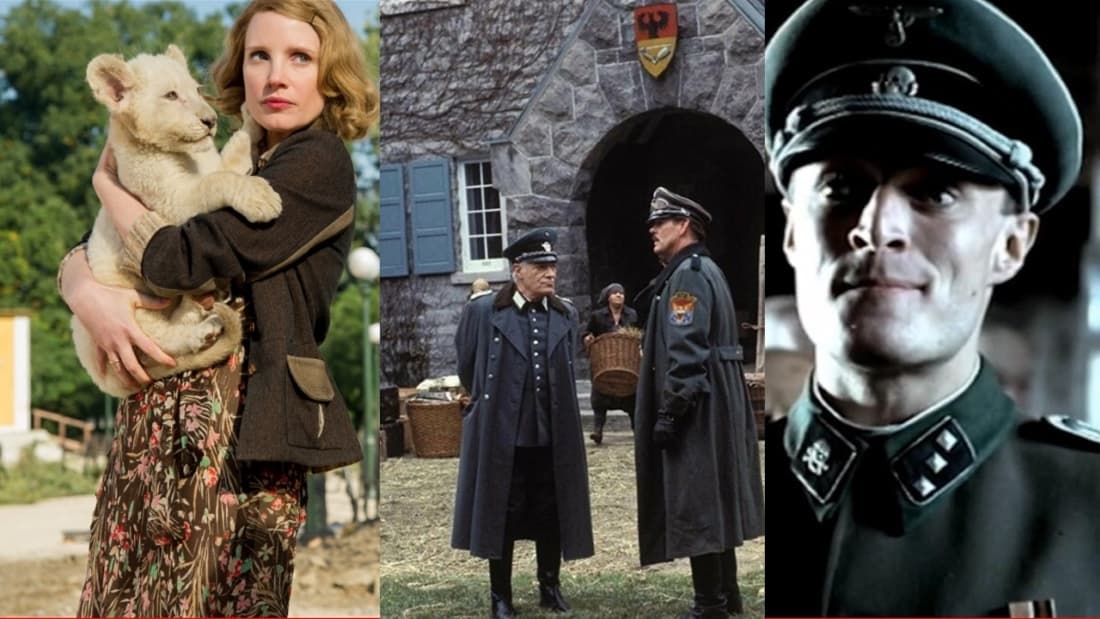
All wars usually mean a significant loss of life, loved ones, and broken families. Since the beginning of civilization, we have seen the harm that wars have caused. As much as the actual conflict, the destabilization of economies, communities, and jobs also adds to the devastation.
World War II also came with the loss of life and loved ones. But, what was the biggest contributor to the loss of lives and loved ones during this war?
Was it just the fall of half of Europe and Japan? No, the biggest contributor to the harm done by World War II was the Nazi Holocaust. The irrational ethnic cleansing conducted by Hitler and his party caused the death of over six million Jews.
While the number of people who suffered can be measured, the damage done to the survivors cannot be measured. All this madness was done in the name of nationalism, patriotism, and the superiority of race and religion.
While most of us have never experienced or witnessed that level of cruelty of man, we can get a glimpse of it and the damage it caused through movies. While Hollywood has made many films on the Holocaust and World War, the most poignant and soul-stirring films on this topic came from European filmmakers.
We, at ENTOIN, have compiled a list of the best movies based on the Holocaust and its after-effects.
Shoah
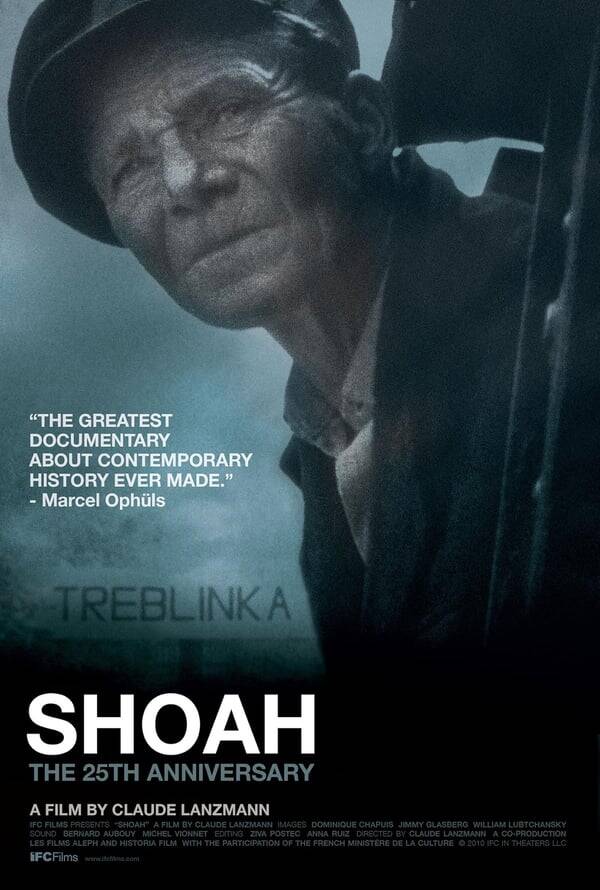
DocumentaryHistoryWar
Director:
Claude Lanzmann
Star Cast:
Simon Srebnik, Michael Podchlebnik, Motke Zaïdl
Box Office (Worldwide):
$20,175
Shoah is a profound French documentary directed by Claude Lanzmann. Spanning nine hours and taking eleven years to complete, the film's title "Shoah" is the Hebrew word for Holocaust, reflecting the film's depth and seriousness.
The documentary features interviews with survivors, witnesses, and even perpetrators of the Holocaust. Filmed at various extermination camps and Holocaust sites across Poland and Germany, Shoah focuses primarily on four locations. These include the Chelmno extermination camp near Łódź, noted for its use of mobile gas chambers to murder Jews.
The other highlighted sites are the Treblinka camp, Auschwitz-Birkenau, and the Warsaw Ghetto. At each location, survivors and witnesses offer detailed and moving testimonies about their experiences during one of history’s darkest chapters.
Shoah has received numerous prestigious awards, including the New York Film Critics Circle Award for Best Non-Fiction Film and the BAFTA Award for Best Documentary, underscoring its impact and significance.
Thank you for exploring our Holocaust film recommendations at ENTOIN. If you have any suggestions, we welcome your feedback and messages.
Recommended:
Schindler's List
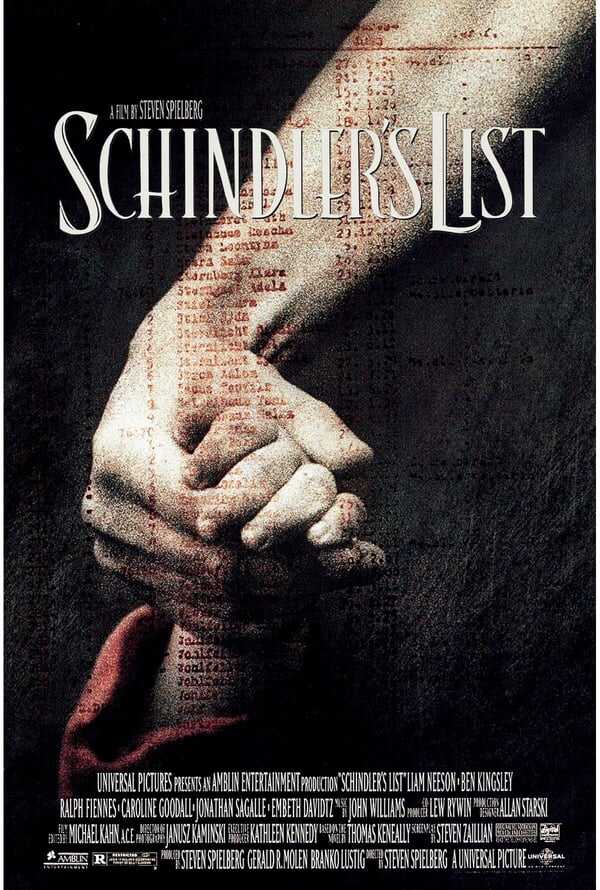
BiographyDramaHistory
Director:
Steven Spielberg
Release Date:
Fri Feb 4 1994
Star Cast:
Liam Neeson, Ralph Fiennes, Ben Kingsley
Budget:
$22,000,000 (estimated)
Box Office (Worldwide):
$322,161,245
Schindler’s List, directed by Steven Spielberg, tells the powerful true story of Oskar Schindler. The screenplay, crafted by Steven Zaillian, is based on Thomas Keneally’s novel, Schindler’s Ark.
Widely regarded as one of the greatest films ever made, the movie chronicles Schindler’s courageous efforts to save Jewish lives during World War II. By offering shelter and employment in his factory, he rescued many from the horrors of concentration camps and provided them with safer living conditions.
After the war, Schindler fled from the advancing Red Army due to his reputation as a war profiteer. Though he was instrumental in saving 850 Jews from Auschwitz, he ultimately escaped to the West to avoid becoming a prisoner of war.
Schindler’s List garnered widespread acclaim, earning 12 Academy Award nominations and winning seven, including Best Picture, Best Director, and Best Screenplay. The film also received seven BAFTAs, three Golden Globes, and numerous other honors.
Recommended:
The Pianist
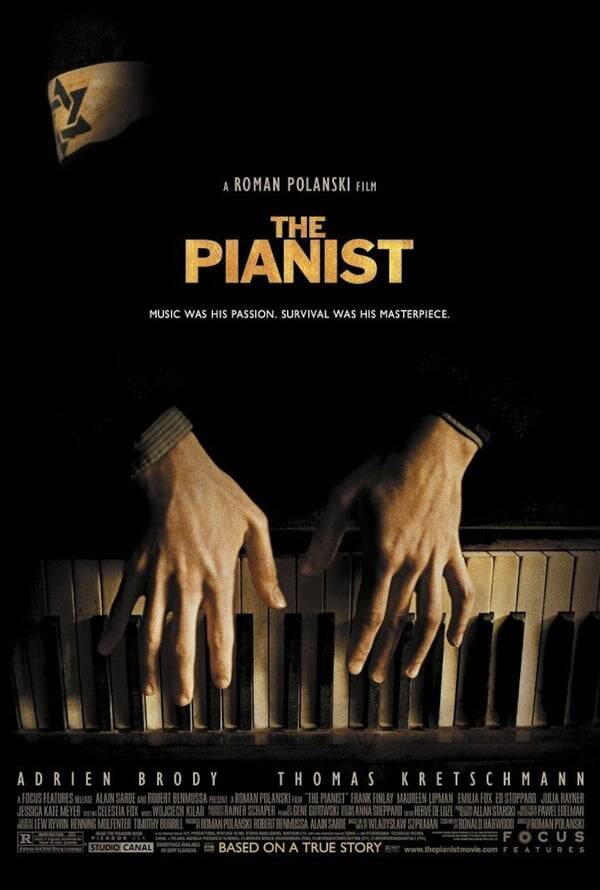
BiographyDramaMusic
Director:
Roman Polanski
Release Date:
Fri Mar 28 2003
Star Cast:
Adrien Brody, Thomas Kretschmann, Frank Finlay
Budget:
$35,000,000 (estimated)
Box Office (Worldwide):
$120,072,577
"The Pianist" is a moving biographical film centered on the harrowing experiences of a Holocaust survivor. Based on the autobiography of Wladyslaw Szpilman, a renowned Polish composer and pianist, the film is masterfully directed by Roman Polanski with a screenplay by Ronald Harwood.
The story follows Wladyslaw Szpilman, a Polish Jewish musician, whose world is shattered when Nazi Germany invades Poland. As Jews and those aiding them face relentless persecution—being killed or deported to camps—Szpilman desperately fights for survival.
He endures hardship in a series of hiding places arranged by friends, but his situation worsens when he is forced to leave, grappling with starvation and illness. Against the odds, a compassionate Nazi officer discovers Szpilman and secretly provides him shelter and sustenance.
Restored to health, Szpilman survives until Poland is liberated by Soviet forces. The film received international acclaim, winning the Palme d'Or at the Cannes Film Festival and three Academy Awards for Best Director, Best Actor, and Best Adapted Screenplay.
Critics commended Polanski's exceptional direction and Harwood's screenplay, while Adrien Brody earned his first Oscar for his profound portrayal of Szpilman.
Au revoir les enfants
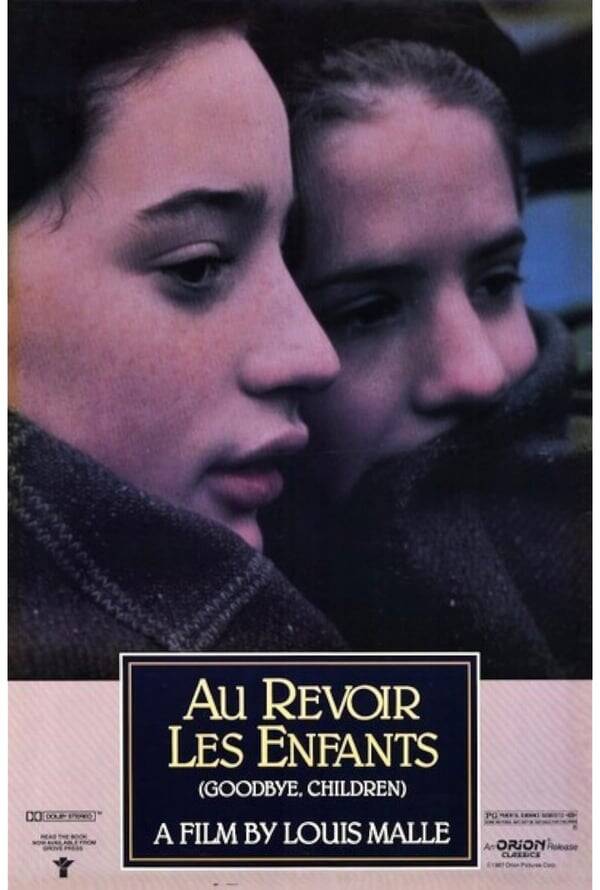
DramaWar
Director:
Louis Malle
Release Date:
Fri Feb 12 1988
Star Cast:
Gaspard Manesse, Raphael Fejtö, Francine Racette
Box Office (Worldwide):
$4,575,613
Au revoir les enfants is a poignant French drama that explores how war and the Holocaust impact children living in a boarding school. The film is the work of acclaimed director Louis Malle, who wrote, directed, and produced this moving story.
Drawing inspiration from his own childhood, Malle sets the film in a Roman Catholic school, echoing his personal experiences as a student during World War II. The film opens with the start of a new school year, setting a tone of innocence soon challenged by harsh realities.
When the headmaster introduces three new students, it becomes apparent that they are different from the others. Eventually, it is revealed that they are Jewish boys whom the compassionate headmaster has agreed to shelter, risking his own safety.
The story takes a tragic turn when a school chef betrays their secret to the Gestapo. Authorities raid the school, and both the headmaster and the three boys are arrested and deported to concentration camps at Auschwitz and Mauthausen, where their lives are ultimately lost.
The headmaster, Père Jacques, was later honored by Yad Vashem as one of the Righteous Among the Nations, recognizing his courage and humanity. The film was awarded the Golden Lion at the Venice Film Festival and received several nominations, including Academy Award and Golden Globe nods for Best Foreign Language Film.
Recommended:
Son of Saul
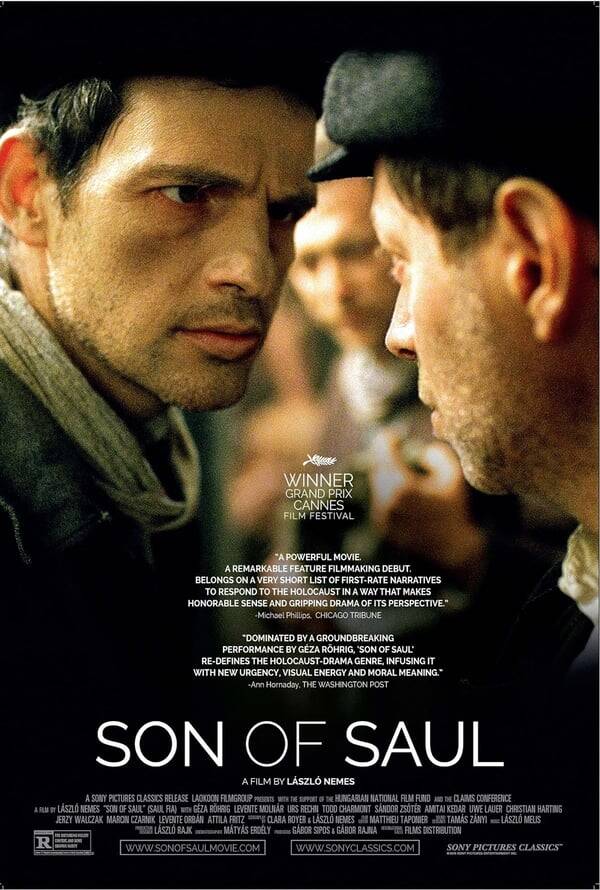
DramaWar
Director:
László Nemes
Release Date:
Thu Jun 11 2015
Star Cast:
Géza Röhrig, Levente Molnár, Urs Rechn
Budget:
€1,500,000 (estimated)
Box Office (Worldwide):
$6,659,121
"Son of Saul" ("Saul fia") is a powerful Hungarian film set in the infamous Auschwitz concentration camp. Directed by László Nemes and co-written with Clara Royer, this gripping story offers an unflinching portrayal of the Holocaust through the eyes of one man.
The film became the ninth Hungarian entry to be nominated for the Academy Award for Best Foreign Language Film. It follows Saul Ausländer, a Jewish prisoner forced to serve as a Sonderkommando, dealing with the atrocities within the camp.
One day, while cleaning a gas chamber, Saul discovers the body of a boy, sparking an overwhelming need to provide the child with a proper Jewish burial. To others, he claims the boy is his illegitimate son, deepening his determination despite the nearly insurmountable circumstances.
Saul’s attempts to fulfill this sacred duty are met with failure. He also becomes caught up in a failed uprising among the prisoners. In an effort to escape and join the Polish Resistance, he is ultimately discovered and gunned down by SS guards.
Notably, "Son of Saul" is the second Hungarian film ever to win the Academy Award for Best Foreign Film and also garnered the Golden Globe for Best Foreign Language Film. It was met with critical acclaim, earning a 96% rating on Rotten Tomatoes and a 7.5 on IMDb.
The Guardian called the film "a horror story with extraordinary focus and courage," awarding it a coveted five-star review.
Ida
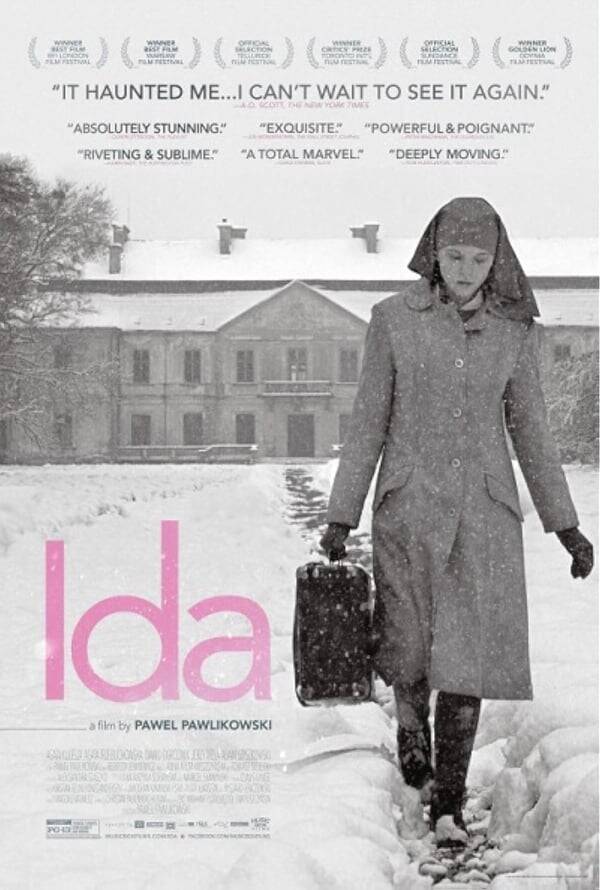
Drama
Director:
Pawel Pawlikowski
Release Date:
Fri Oct 25 2013
Star Cast:
Agata Kulesza, Agata Trzebuchowska, Dawid Ogrodnik
Box Office (Worldwide):
$11,156,836
"Ida" is a 2013 Polish drama directed by Paweł Pawlikowski. The film achieved significant acclaim, becoming a crossover hit in the United States and performing exceptionally well in France.
Set in 1962, the story follows Anna, a young woman preparing to become a nun. When she learns her parents were Jewish, Anna embarks on a journey with her aunt Wanda to uncover the truth about their family's fate during World War II.
The film masterfully explores themes of guilt, violence, and pain through its haunting and atmospheric visuals. It delves into the complexities of identity, history, and personal choice as experienced by its deeply nuanced characters.
"Ida" was awarded the 2015 Academy Award for Best Foreign Language Film, making history as the first Polish film to win in this category.
The Last Days
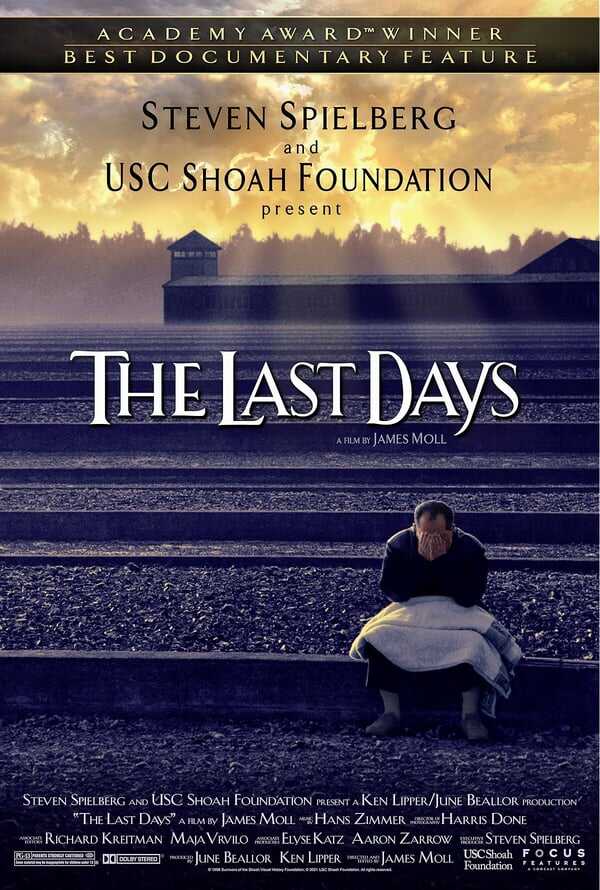
DocumentaryWar
Director:
James Moll
Release Date:
Thu Jul 15 1999
Star Cast:
Bill Basch, Martin Basch, Randolph Braham
Box Office (Worldwide):
$421,432
"The Last Days" is a powerful documentary that captures the final events of the Holocaust, or Shoah. Produced by June Beallor and Kenneth Lipper, in association with the Shoah Foundation, the film offers a poignant look into this tragic period of history.
The documentary delves into the lives of survivors during their final year in the concentration camps, showcasing their struggles, moments of hope, and ultimate perseverance. Through archival footage, photographs, and firsthand testimonies, viewers gain deep insight into the realities of those harrowing days.
Featuring voices like Tom Lantos, Dario Gabbai, Randolph Braham, and others, the film includes accounts from Holocaust survivors, U.S. soldiers who liberated the Dachau camp, and even former SS doctor Hans Munch, providing a range of perspectives on these historic events.
"The Last Days" earned the Academy Award for Best Documentary, and in 2021, Netflix digitally remastered and made the film available to a global audience. It holds impressive ratings, with a 92% score on Rotten Tomatoes and a 7.8 rating on IMDb.
Downfall
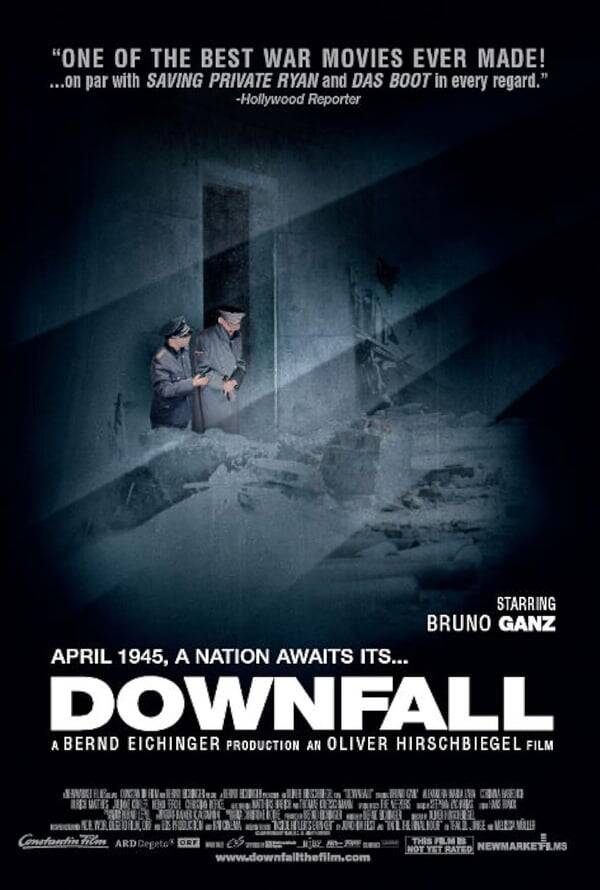
BiographyDramaHistory
Director:
Oliver Hirschbiegel
Release Date:
Fri Apr 8 2005
Star Cast:
Bruno Ganz, Alexandra Maria Lara, Ulrich Matthes
Budget:
€13,500,000 (estimated)
Box Office (Worldwide):
$92,181,574
"Downfall" is a gripping German historical war drama that explores the final days of Adolf Hitler and his inner circle as they hide in the Führerbunker. The narrative is inspired by the books "Inside Hitler's Bunker" by historian Joachim Fest and "Until the Final Hour" by Traudl Junge.
The film meticulously portrays the last ten days of the Battle of Berlin, depicting how Soviet forces rapidly close in on the city while the Nazi party's leaders either fall or abandon their cause.
The audience witnesses the tense events from Hitler’s 56th birthday on April 20th to his suicide on April 30th, 1945. Praised for its powerful depiction, the film earned an Academy Award nomination for Best Foreign Language Film.
"Downfall" was nominated for 34 awards overall, winning 22. Critics commended the film for offering an illuminating and detailed portrayal of Hitler’s final days, making it both thought-provoking and historically insightful.
With a 90% fresh rating on Rotten Tomatoes and global earnings exceeding $93 million, "Downfall" achieved significant success. However, it was also controversial, as some believed it risked humanizing Hitler and eliciting undue sympathy.
Into the Arms of Strangers: Stories of the Kindertransport
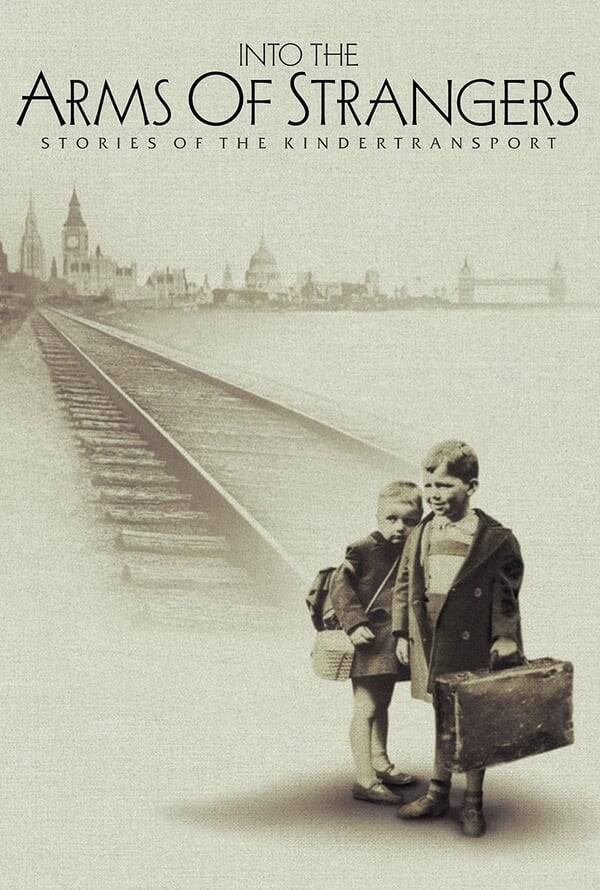
DocumentaryHistoryWar
Director:
Mark Jonathan Harris
Release Date:
Fri Nov 24 2000
Star Cast:
Judi Dench, Lory Cahn, Kurt Fuchel
Into the Arms of Strangers: Stories of the Kindertransport is a poignant British documentary that chronicles the remarkable Kindertransport rescue effort. Directed by Mark Jonathan Harris and produced by Deborah Oppenheimer, the film shines a light on this life-saving mission.
The documentary powerfully highlights the humanitarian actions of British rescuers who helped thousands of children escape Nazi persecution from Germany, Austria, and Czechoslovakia. Nearly 10,000 young lives were saved and placed with foster families across Britain during this operation.
Through rare footage, photographs, and artifacts—many sourced from the United States Holocaust Memorial Museum—the documentary vividly recounts these stories. Testimonies from child survivors, their rescuers, parents, and foster families provide a deeply personal perspective.
Narrated by Dame Judi Dench, the film won the Academy Award for Best Documentary Feature and was later inducted into the National Film Registry by the Library of Congress, honoring its enduring impact.
Europa Europa
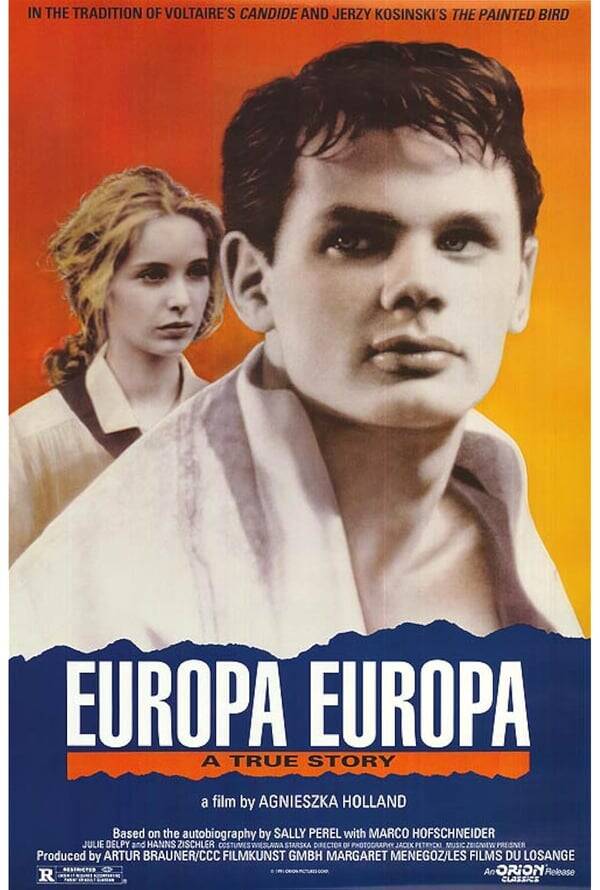
DramaHistoryWar
Director:
Agnieszka Holland
Release Date:
Wed Nov 14 1990
Star Cast:
Solomon Perel, Marco Hofschneider, René Hofschneider
Box Office (Worldwide):
$5,575,738
"Europa Europa" is a powerful German film adapted from the real-life memoirs of Solomon Perel. Directed by Agnieszka Holland and created with an international team, the movie follows the journey of Solomon, a young German-Jewish boy.
On his bar-mitzvah, Solomon's life is upended when Kristallnacht forces his family to flee to Poland in hopes of escaping Nazi persecution. Despite their efforts, the Nazis invade Poland, and his family is forced into a Jewish ghetto.
Solomon and his brother Izaac become separated from the rest of their family. The two eventually escape to the USSR, where, through a twist of fate, Solomon is mistaken for Josef Peters, a Catholic child.
Living under constant threat, Solomon narrowly avoids his true identity being discovered multiple times. He is ultimately conscripted into the Nazi army and sent to fight the Soviets. There, he seizes an opportunity to surrender to the Red Army and finally reveals that he is Jewish.
The film received an Academy Award nomination for Best Adapted Screenplay, though it did not win. Despite expectations, it was not submitted as Germany's entry for Best Foreign Film.
Nevertheless, "Europa Europa" won the Golden Globe for Best Foreign Film, cementing its place as a significant and poignant Holocaust drama.
Inglourious Basterds
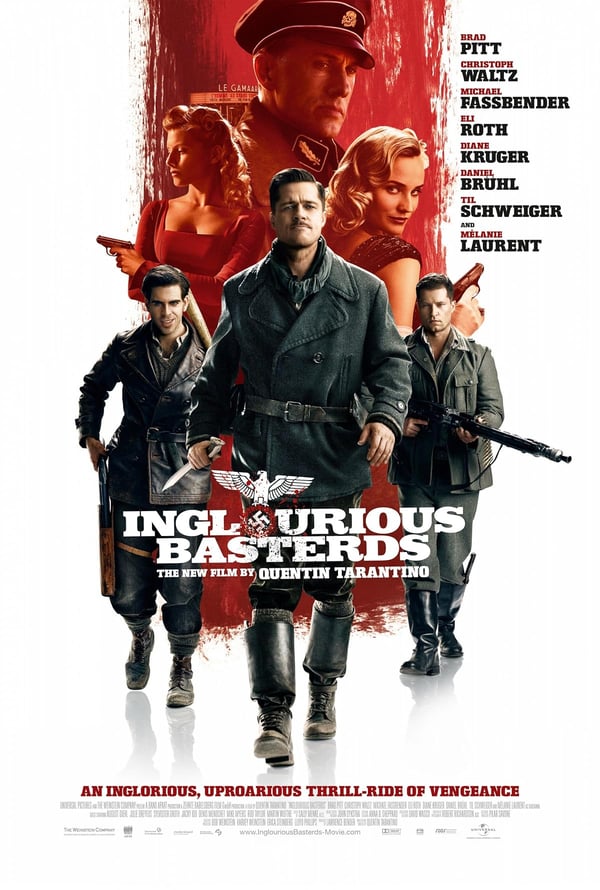
AdventureDramaWar
Director:
Quentin Tarantino
Release Date:
Fri Aug 21 2009
Star Cast:
Brad Pitt, Diane Kruger, Eli Roth
Budget:
$70,000,000 (estimated)
Box Office (Worldwide):
$321,457,747
"Inglourious Basterds," written and directed by Quentin Tarantino, is a gripping war film that stands out for its bold storytelling. Tarantino began developing the story in 1998 but delayed its completion until he found a conclusion that satisfied him.
The film presents a thrilling alternate history where plots to assassinate Hitler actually succeed. Two separate groups work independently towards Hitler's downfall, each executing their own intricate plans.
One plot is masterminded by Shosanna Dreyfus, a Jewish cinema owner, while the other involves British intelligence. The British plan soon merges with efforts by a group of American Jewish soldiers, who become infamous for their relentless vigilante attacks on captured Nazis.
Their path takes a dangerous turn when the cunning SS officer Hans Landa enters the picture. "Inglourious Basterds" received several Academy Award nominations, including Best Picture, Best Director, Best Screenplay, and Best Cinematography.
Christoph Waltz won the Oscar for Best Supporting Actor for his unforgettable portrayal of Hans Landa. The film also garnered critical acclaim, holding an 89% rating on Rotten Tomatoes and an IMDb score of 8.3.
Judgment at Nuremberg
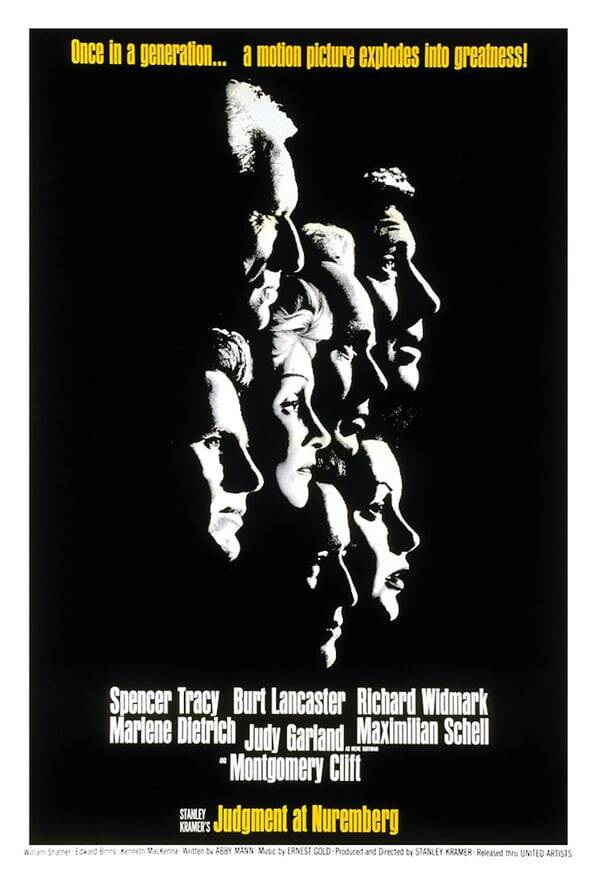
DramaWar
Director:
Stanley Kramer
Release Date:
Mon Dec 18 1961
Star Cast:
Spencer Tracy, Burt Lancaster, Richard Widmark
Budget:
$3,000,000 (estimated)
Box Office (Worldwide):
$12,180
"Judgment at Nuremberg" is a powerful American drama that explores the landmark Nuremberg Military Tribunals, where German-Nazi officials were held accountable for crimes against humanity. Directed and produced by Stanley Kramer, the film delves deeply into the moral complexities of postwar justice.
The story focuses on one of the twelve specific cases tried by the Nuremberg Tribunal, overseen by the US Military. Chief Trial Judge Dan Haywood presides over the proceedings, which involve four German judges and prosecutors as the accused.
These individuals stand trial for their roles in committing atrocities and enabling the Holocaust under Nazi rule. The film compellingly addresses the far-reaching horror of war crimes and the pursuit of justice in their aftermath.
Featuring a stellar ensemble cast—including Spencer Tracy, Montgomery Clift, Burt Lancaster, Marlene Dietrich, and Judy Garland—the film received multiple Academy Award nominations, such as Best Picture, Best Actor, Best Director, Best Supporting Actor, and Best Supporting Actress.
It ultimately won Oscars for Maximilian Schell as Best Actor and for Abby Mann's Best Original Screenplay, solidifying its place as a cinematic classic.
In Darkness
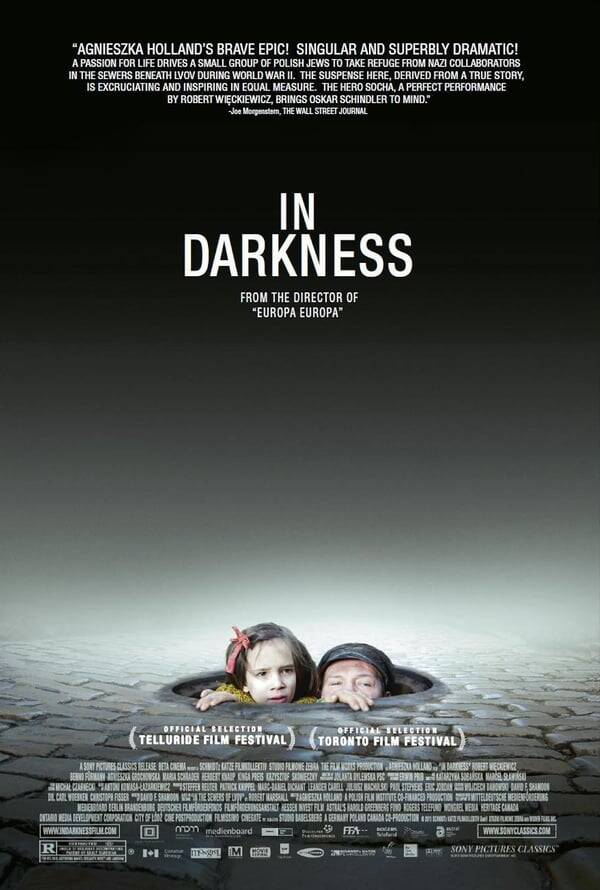
DramaWar
Director:
Agnieszka Holland
Release Date:
Thu Jan 5 2012
Star Cast:
Robert Wieckiewicz, Benno Fürmann, Agnieszka Grochowska
Box Office (Worldwide):
$9,955,885
In Darkness is a powerful Polish World War II drama centered around sewage inspector Leopold Socha and his colleague Szczepek Wróblewski. Based on a true story and directed by Agnieszka Holland from a screenplay by David F. Shamoon, the film is set in the Polish city of Lwów in 1943, where the Nazis decided to liquidate the local ghetto.
A desperate group of Jews managed to escape and found refuge within the city’s extensive sewer system. Using his expertise, Socha, aided by Wróblewski, kept these fugitives hidden for nearly 18 months, until the Russian army liberated the city in 1944.
Following the war, both Socha and Wróblewski were honored with the Righteous Among the Nations medal in recognition of their remarkable courage and compassion. The film went on to earn an Academy Award nomination for Best Foreign Language Film at the 84th Oscars.
In Darkness received an 88% score on Rotten Tomatoes and a 7.3 on IMDb. Critics praised it as a suspenseful, intense film, lauding its gripping performances and vivid portrayal of life both above and below the city’s streets.
Life Is Beautiful
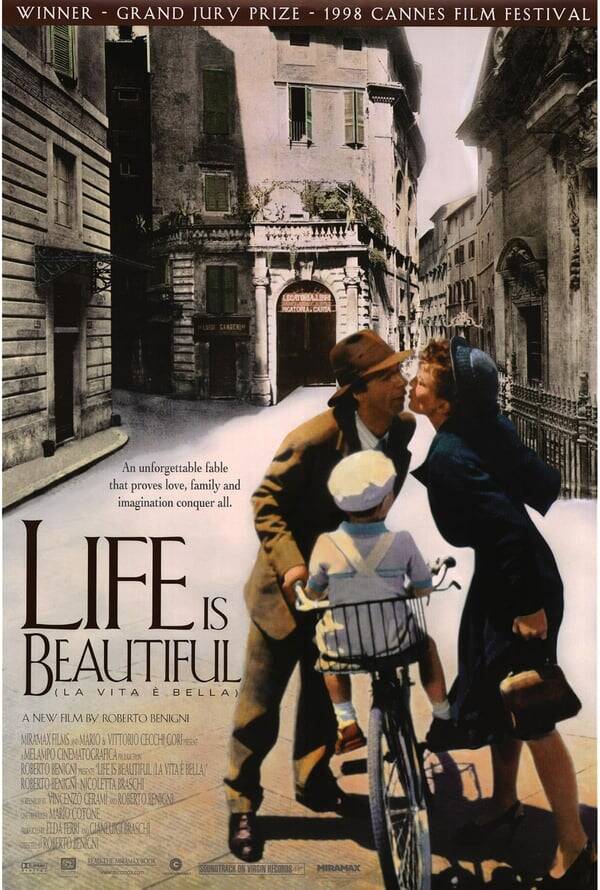
ComedyDramaRomance
Director:
Roberto Benigni
Release Date:
Sat Dec 20 1997
Star Cast:
Roberto Benigni, Nicoletta Braschi, Giorgio Cantarini
Budget:
$20,000,000 (estimated)
Box Office (Worldwide):
$230,099,013
"Life Is Beautiful" is a poignant tragi-comedy about an Italian Jewish family whose lives are upended when they are sent to a concentration camp. Directed by, starring, and co-written by Roberto Benigni, alongside Vincenzo Cerami, the film masterfully blends humor and heartbreak.
Partly inspired by Benigni’s own father’s internment during World War II, the movie follows a close-knit family running a small bookstore in Arezzo, Italy. Their peaceful existence is shattered when Nazi forces arrive, rounding up all the Jews in the city.
The Orefice family—Guido, his wife Dora, and their young son Giosuè—must confront unimaginable challenges. Guido, using his boundless imagination, invents an elaborate game to shield his son from the horrors surrounding them and to preserve Giosuè’s innocence through the ordeal.
Guido’s determination persists until the war’s end, with the family ultimately rescued by Allied troops. The film garnered widespread acclaim, winning the Grand Prix at Cannes, three Academy Awards, the Nastro D’Argento Awards, two European Film Awards, and more.
Critics praised "Life Is Beautiful," earning it an 80% rating on Rotten Tomatoes and an impressive 8.6 on IMDb.
The Painted Bird
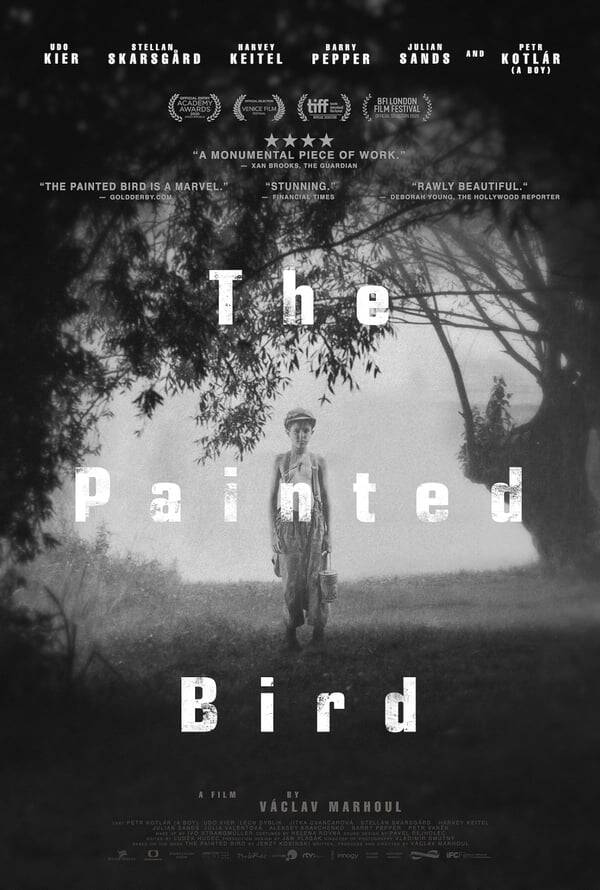
DramaHorrorThriller
Director:
Václav Marhoul
Release Date:
Fri Jul 17 2020
Star Cast:
Petr Kotlár, Nina Sunevic, Alla Sokolova
Budget:
CZK 175,000,000 (estimated)
Box Office (Worldwide):
$659,535
"The Painted Bird" is a Czech film that served as the official entry for the 92nd Academy Awards and successfully reached the December shortlist. Adapted from Jerzy Kosiński's acclaimed novel, this thought-provoking movie immerses viewers in a haunting narrative set during World War II.
The film is uniquely presented in the Interslavic language, intentionally chosen to avoid offending any specific nationality. It follows the harrowing journey of an orphaned Jewish boy, who moves from one dire predicament to another throughout the war-torn countryside.
While he occasionally encounters moments of compassion and sympathy, the boy is overwhelmingly subjected to violence, hatred, and depravity. Even though he is never sent to a concentration camp, he endures unimaginable horrors at the hands of villagers driven by prejudice.
Throughout his ordeal, the boy faces relentless anti-Semitic hatred, anger, jealousy, and cruelty. The film garnered criticism for its graphic violence and disturbing imagery, causing some viewers at the Venice, Toronto, and London film festivals to walk out.
Despite its controversial nature, "The Painted Bird" received a standing ovation at the Warsaw Film Festival, highlighting its profound impact on audiences.
Black Book
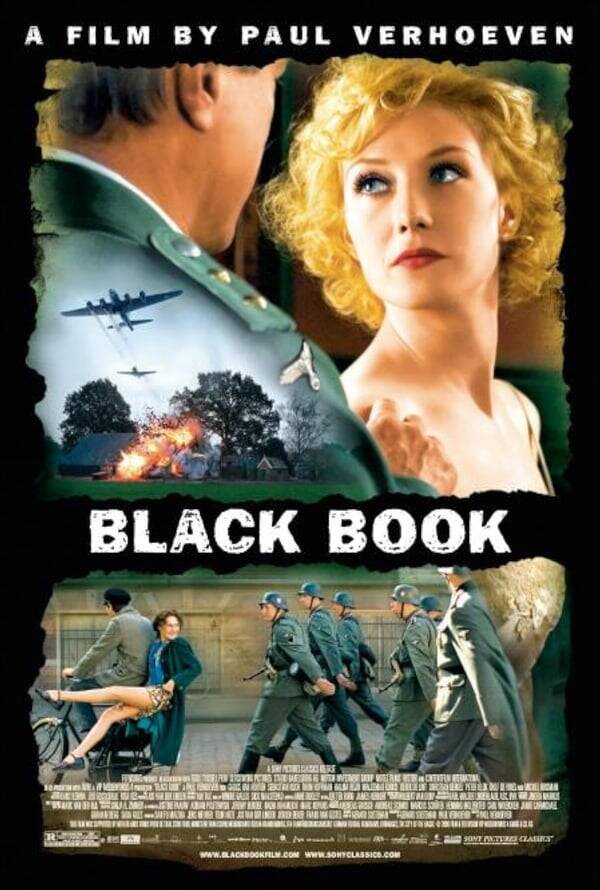
DramaThrillerWar
Director:
Paul Verhoeven
Release Date:
Fri May 18 2007
Star Cast:
Carice van Houten, Sebastian Koch, Thom Hoffman
Budget:
$21,000,000 (estimated)
Box Office (Worldwide):
$26,768,563
"Black Book" (2006) is a gripping war thriller set in Nazi-occupied Netherlands. The story follows Rachel Stein, a Jewish singer forced into hiding by the horrors of persecution. After losing her family in a brutal ambush, she is driven by both vengeance and the desire for freedom, ultimately joining the Dutch resistance as a daring and resourceful spy.
Operating under the alias "Ellis," Rachel infiltrates Gestapo headquarters and maneuvers through a treacherous web of lies, facing danger from every side. She must balance her covert missions with her complicated relationship with her handler, Captain Müntze, all while concealing her true identity. Rachel's quest to expose a traitor within the resistance puts everything at risk, forcing her to grapple with shifting loyalties and love amidst constant peril.
Though not a box-office blockbuster, "Black Book" was widely praised for its intense storyline, powerful performances, and its fearless portrayal of the tough moral decisions faced during wartime. The film sparked debate thanks to its nuanced depiction of ethical dilemmas but left a lasting impression on audiences and critics alike.
Sophie's Choice
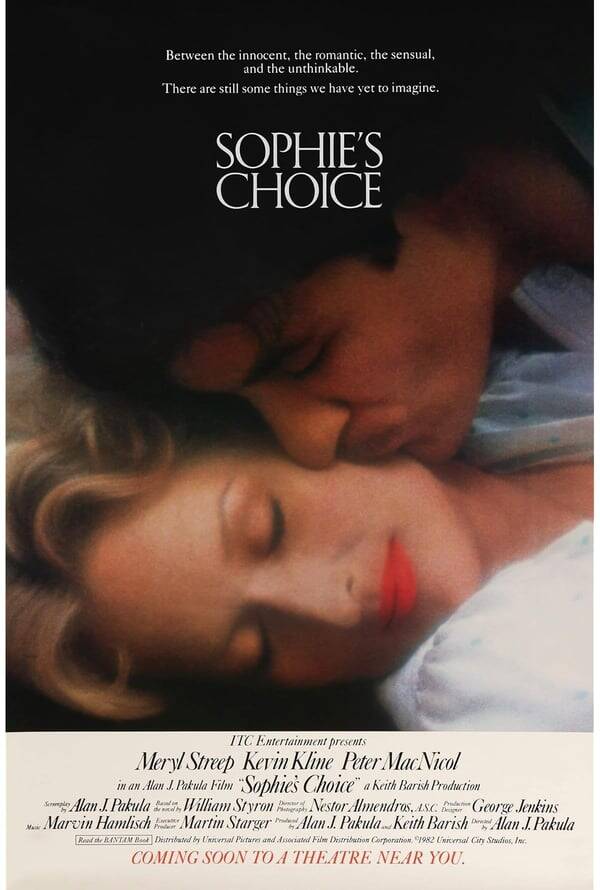
DramaRomance
Director:
Alan J. Pakula
Release Date:
Fri Mar 4 1983
Star Cast:
Meryl Streep, Kevin Kline, Peter MacNicol
Budget:
$12,000,000 (estimated)
Box Office (Worldwide):
$30,036,166
"Sophie’s Choice," based on William Styron’s acclaimed novel, is a powerful American film directed by Alan Pakula. Meryl Streep delivers a mesmerizing performance as Sophie, a Polish immigrant haunted by a harrowing past.
The story follows Stingo, an aspiring writer who moves to Brooklyn and befriends Sophie and her troubled partner, Nathan. Nathan's volatile nature is fueled by jealousy and suspicion, leading to turmoil within the trio's relationship.
As Stingo unravels the depths of Sophie’s tragic history and uncovers the reasons behind Nathan's behavior, he is drawn into their emotional struggles. Sophie’s life is marked by overwhelming guilt and psychological scars from her experiences during the Holocaust.
Tragically, Sophie and Nathan ultimately take their own lives. The film was met with critical acclaim and achieved commercial success, earning five Academy Award nominations, including Best Adapted Screenplay and Best Cinematography.
Meryl Streep's extraordinary portrayal of Sophie earned her the Oscar for Best Actress.
Sunshine
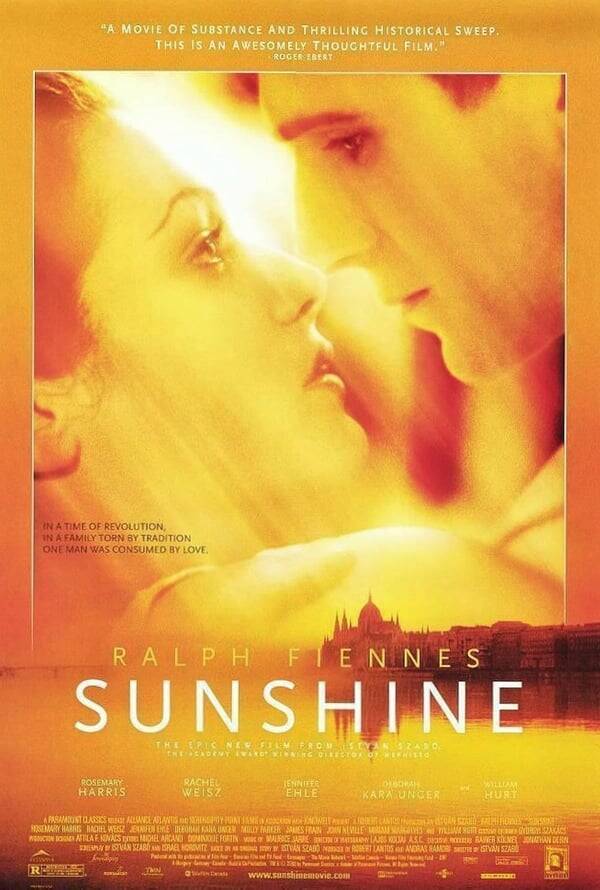
DramaHistoryRomance
Director:
István Szabó
Release Date:
Fri Jul 14 2000
Star Cast:
Ralph Fiennes, Rosemary Harris, Rachel Weisz
Budget:
CA$26,000,000 (estimated)
Box Office (Worldwide):
$7,918,035
"Sunshine" is a compelling historical drama that follows the Hungarian-Jewish Sonnenschein family. Directed by István Szabó and written by Israel Horovitz, the film explores the profound challenges faced by three generations as they navigate shifting political and social landscapes in Hungary.
The story reveals how the family endures discrimination and persecution due to their Jewish heritage, eventually feeling compelled to renounce their faith. Despite this, their ancestry leads to further hardship as they are ultimately deported to concentration camps.
The film's title, "Sunshine," translates from the family's original surname, Sonnenschein, later changed to the Hungarian "Sors," meaning Fate. Remarkably, Ralph Fiennes portrays all three lead male characters—Ignatz, Adam, and Ivan—across the generations.
"Sunshine" received a 7.5 rating on IMDb and a 74% score on Rotten Tomatoes. The film garnered three European Film Awards, including Best Actor for Fiennes, and won three Genie Awards in Canada, notably Best Motion Picture.
The Ninth Day
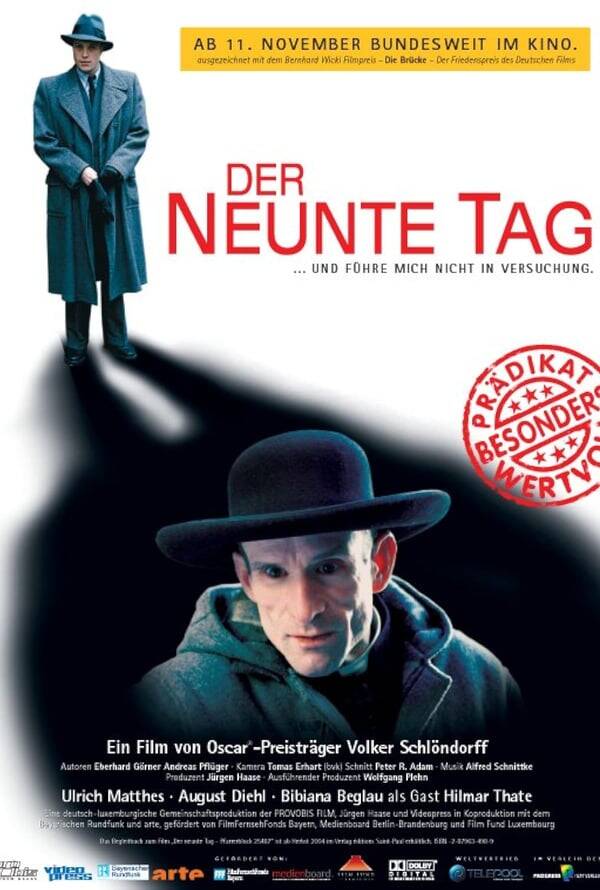
DramaThrillerWar
Director:
Volker Schlöndorff
Release Date:
Thu Nov 11 2004
Star Cast:
Ulrich Matthes, August Diehl, Hilmar Thate
Box Office (Worldwide):
$135,311
The Ninth Day is a compelling German historical drama inspired by passages from Pfarrerblock 25487, the diary of Father Jean-Bernard. Distributed by Kino International, the film tells the story of Henri Kramer, a Catholic priest imprisoned in the Dachau concentration camp alongside many other priests.
While enduring the camp’s brutal conditions, Kramer witnesses the immense trials faced by his fellow clergy. Unexpectedly, he receives a nine-day furlough with a mission: to persuade a bishop from his hometown to align with Nazi directives.
Should he fail, he must return to the horrors of Dachau—a dilemma that forces him to choose between staying true to his beliefs or saving himself from further suffering. This moral conflict lies at the heart of the film's tension.
The Ninth Day boasts a 77% fresh rating on Rotten Tomatoes and a 7.1 score on IMDb. The film earned 13 award nominations, winning six—including a Golden Film Award at the German Film Awards, the Audience Award, and the Crystal Simorgh Award at the Fajr Film Festival.
The Diary of Anne Frank
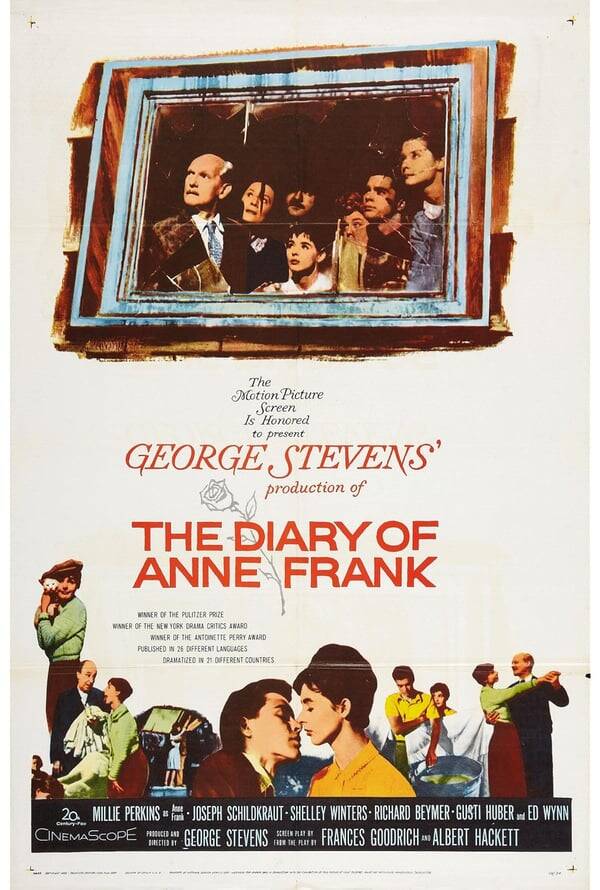
BiographyDramaFamily
Director:
George Stevens
Release Date:
Fri Apr 17 1959
Star Cast:
Millie Perkins, Shelley Winters, Joseph Schildkraut
Budget:
$3,800,000 (estimated)
"The Diary of Anne Frank" (1959) presents a moving biographical portrayal of Anne Frank’s final months spent in hiding from the Nazis. Adapted from Anne’s actual diary, originally published by her father Otto Frank, her story has since been brought to both the stage and the silver screen.
Directed by George Stevens, the film opens in 1945 as Otto Frank steps out of a truck in front of a deserted factory. Overwhelmed with emotion, he finds a girl’s glove and breaks down in tears, marking the solemn beginning of his search for closure.
Soon after, Otto discovers Anne’s diary and begins to read her deeply personal account, shining a light on the struggles and hopes she experienced while hiding in the attic above the factory.
Anne’s family, along with another family, were sheltered by Kraler and his assistant Miep Gies. Tragically, despite their best efforts, they were discovered by the Nazis in 1944 and ultimately deported.
This 1959 adaptation is widely considered the most faithful cinematic depiction of Anne Frank’s life. It garnered three Academy Awards in 1960, including Best Supporting Actress, and received critical acclaim for its outstanding performances and direction.
The film maintains a 79% fresh rating and holds an IMDb score of 7.4, further establishing it as a poignant and significant work about the Holocaust.
Sarah's Key
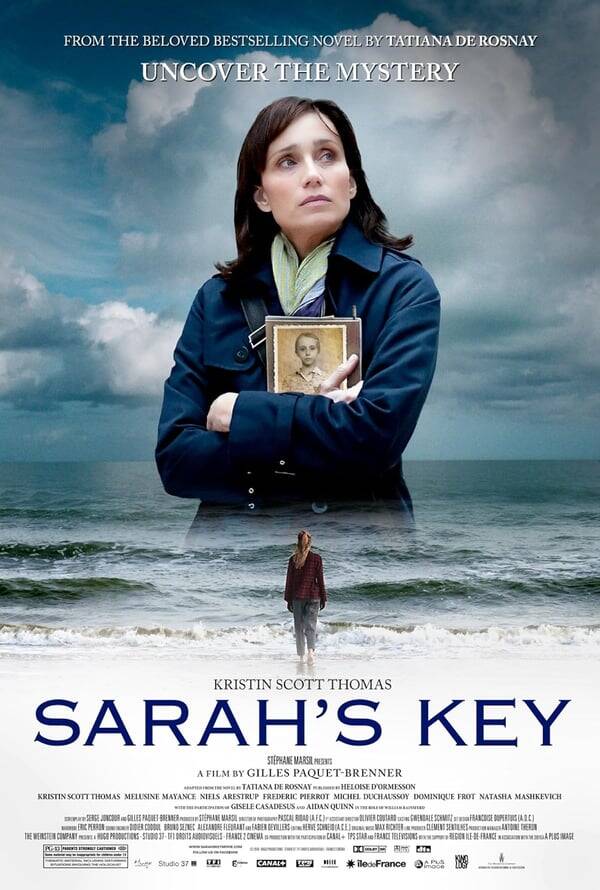
DramaWar
Director:
Gilles Paquet-Brenner
Release Date:
Fri Jul 22 2011
Star Cast:
Kristin Scott Thomas, Mélusine Mayance, Niels Arestrup
Budget:
€10,000,000 (estimated)
Box Office (Worldwide):
$24,792,815
Sarah’s Key is an adaptation of the novel, by Tatiana De Rosnay, of the same name. This French movie focuses on the events that result from the Vel' d'Hiv Roundup of Jews in German-occupied Paris.
The film is co-written and directed by Giles Paquet-Brenner. The story revolves around Julia, a journalist who is researching the story of a young Jewish girl, Sarah Starzynski. In the flashback, we are shown that in 1942, a 10-year-old Sarah was being taken away by the Paris Gendarmes for being a Jew.
Before she leaves, she locks her brother in a hidden closet to keep him safe. By the time she escapes the Nazi soldiers and the Vichy bureaucrats, she is to plate to save her brother.
Although, the elderly couple who save her take her into their family. After the war, Sarah is still haunted by her experiences during the war and hides her identity from even her son until she dies.
The film premiered at the Toronto Film Festival and was later released in France. Rotten Tomatoes gave it a score of 72% and IMDb, 7.5.
Killing Kasztner
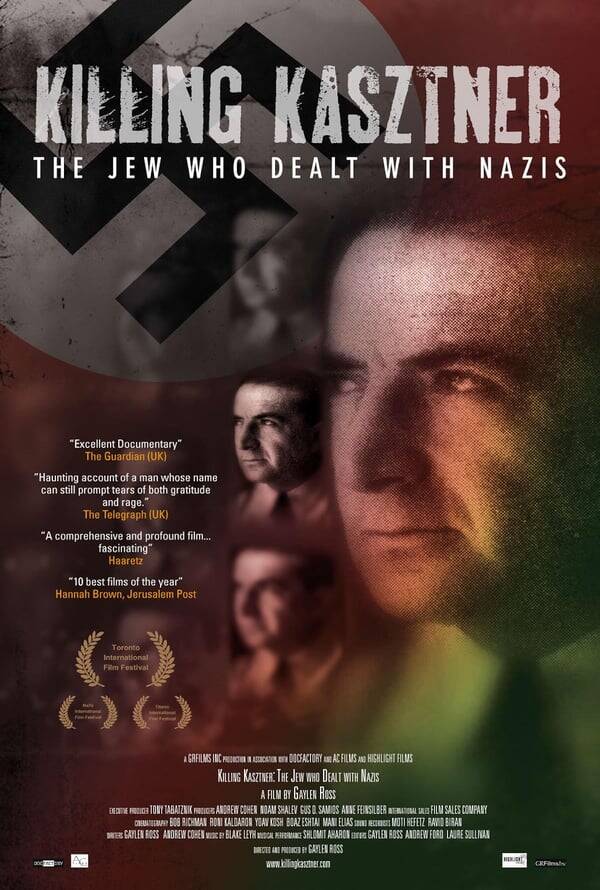
Documentary
Director:
Gaylen Ross
Release Date:
Wed Apr 4 2012
Star Cast:
Rudolf Kasztner
Box Office (Worldwide):
$112,313
Killing Kasztner is a documentary film on the life and controversy surrounding Rudolf Kasztner. The feature-length documentary was made by Gaylen Ross after an interview with a Jewish woman that Kasztner had saved.
The film starts in the Museum of Jewish Heritage in New York City for the first conference on Kasztner, and the open disagreement between the survivors of Kasztner and those who blame him.
This leads to the interviews with Kasztner's daughters and granddaughters who felt it was time to release their family from this ignominy. The filmmaker, Ross, also interviewed the assassin, Eckstein, who shot him, and the son of the lawyer who prosecuted Kasztner.
The documentary brought forward the survivor accounts of many of those saved by Kasztner and presented a different perspective on his case. The film won the audience award at the Boston Jewish Film Festival.
IMDb rated the film 7.2, while Rotten Tomatoes gave the film a 79% fresh score.
Train of Life
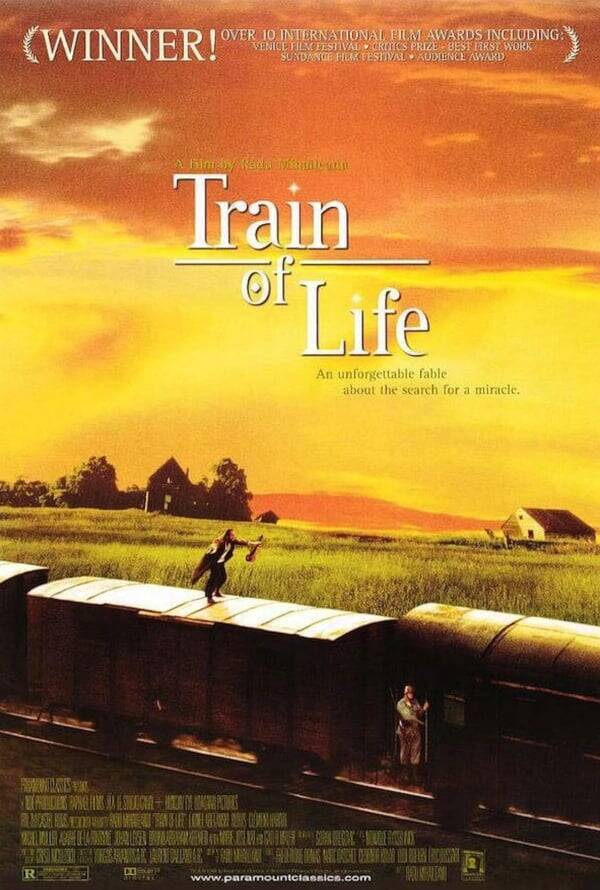
ComedyDramaWar
Director:
Radu Mihaileanu
Release Date:
Wed Sep 16 1998
Star Cast:
Lionel Abelanski, Rufus, Clément Harari
Box Office (Worldwide):
$3,311,162
Train of Life is a French movie that was made as a collaboration between France, the Netherlands, Belgium, Israel, and Romania. The film is a tragicomedy of a village that tries to escape the Holocaust of Jews The film starts with a man frantically running into his village to report the atrocities done against Jews in the nearby village.
He gathers the villagers and they plan to escape by building a train. They plan to ride it to the USSR and escape from there. The film comedically recounts their difficulties in escaping, but they appear to have succeeded.
Yet in the last scene, we discover that the narrator is imprisoned in a concentration camp and has seemingly lost his mind after witnessing the death of his fellow villagers.
The film was rated 64% fresh by Rotten Tomatoes and got an IMDb score of 7.7. The critics gave it a generally positive review, however, the story is similar in concept to a few other Holocaust movies released that year.
They were all built on the same premise of making comedy out of a tragic situation.
Everything Is Illuminated
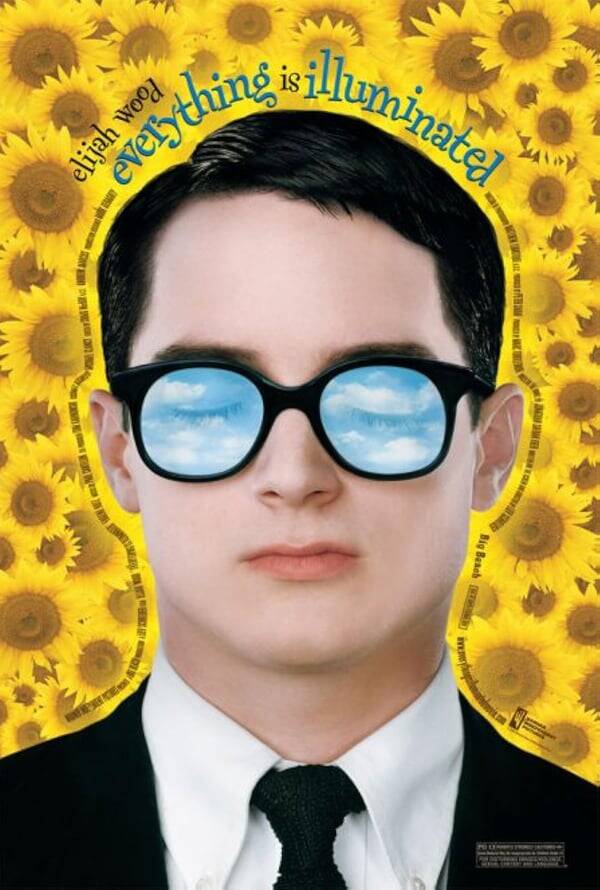
ComedyDrama
Director:
Liev Schreiber
Release Date:
Fri Nov 4 2005
Star Cast:
Elijah Wood, Eugene Hutz, Boris Lyoskin
Budget:
$7,000,000 (estimated)
Box Office (Worldwide):
$3,601,974
Everything is Illuminated is a biographical account of the journey of Jonathan Safran Foer to find the Ukrainian woman who saved his grandfather. The film is a comedy-drama that was written and directed by Liev Schreiber.
It is based on the novel by Jonathan Safran Foer, of the same name. The film follows Foer as he travels to Ukraine to locate the woman who saved his grandfather from the Nazis.
He takes the help of Alex and his grandfather, who are tour guides. Although both of them are fake guides and Alex and his grandfather usually dupe people, they decide to help Foer.
In the end, Foer finds the village that his grandfather hails from and sees it is razed to the ground. He also discovers that the woman who helped was murdered by the Nazis.
Yet, he finds peace after uncovering the truth and sprinkles the soil from the village on his grandfather's grave. The film was praised for combining a serious and heartfelt story with comedic elements without trivializing it.
IMDb gave it a rating of 7.4 and Rotten Tomatoes, 67%. Liev Schreiber was praised for his directorial debut movie.
The Grey Zone
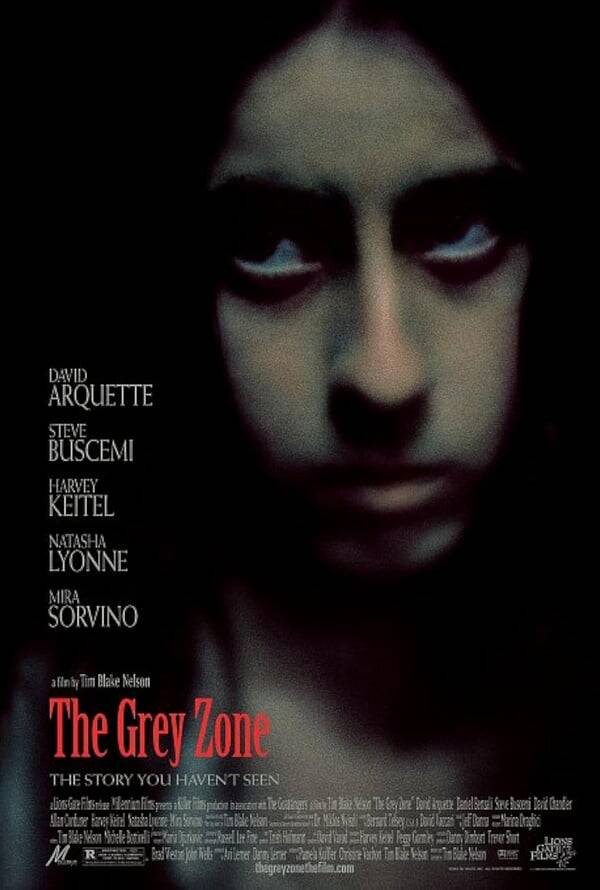
DramaHistoryWar
Director:
Tim Blake Nelson
Release Date:
Fri Nov 30 2001
Star Cast:
David Arquette, Velizar Binev, David Chandler
Budget:
$5,000,000 (estimated)
Box Office (Worldwide):
$621,592
The Grey Zone is a Holocaust film based on the book, Auschwitz: A Doctor's Eyewitness Account written by Dr. Miklós Nyiszli. The story is set in the Auschwitz concentration camp where Josef Mengele, often experimented on the prisoner and had the Jewish Sonderkommando clean up after him.
The story is about the experiences of Dr. Miklós Nyiszli who worked as an assistant to Mengele. He took up the role to ensure the safety of his wife and daughter.
However, after some time, the Sonderkommando formulated a plan to rebel in one of the crematoriums in the death camp. They smuggle in gunpowder from the factory through the women workers in the labor camp.
The plan of insurrection is derailed after a child survives the gas chamber and the group agrees to do all they can to protect her. The Sonderkommando do everything they can to successfully carry out the insurrection and burn down one of the crematories.
Yet, they are all caught and executed after the job. The film was described by critics as a grim and devastating tale of the Holocaust. Rotten Tomatoes gave it a 68% rating and IMDb gave it a 7 rating.
The film won the National Board of Reviews award for Freedom of Expression award.
The Reader
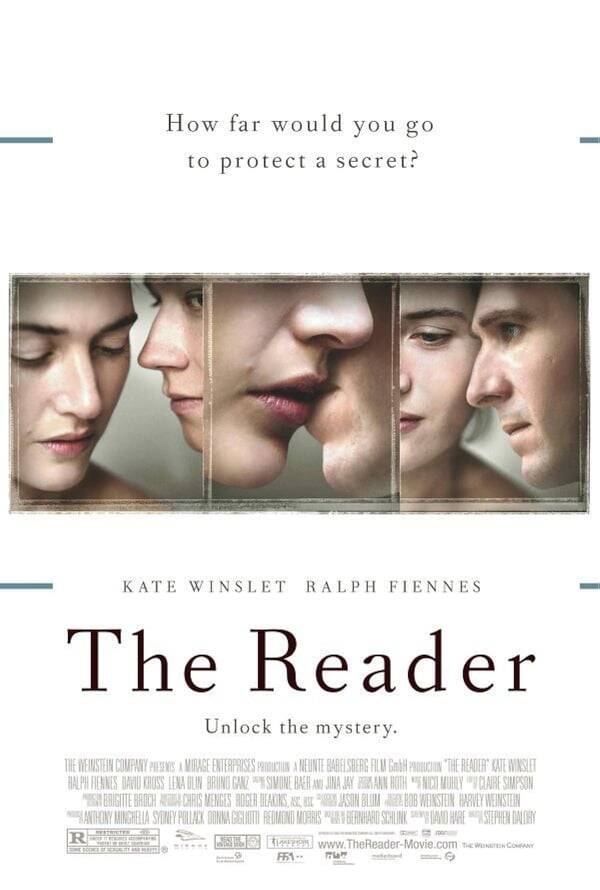
DramaMysteryRomance
Director:
Stephen Daldry
Release Date:
Fri Jan 30 2009
Star Cast:
Kate Winslet, Ralph Fiennes, Bruno Ganz
Budget:
$32,000,000 (estimated)
Box Office (Worldwide):
$108,902,486
The Reader is a drama based on a German novel of the same name, written by Bernhard Schlink. It was adapted into a motion picture by Stephen Daldry with a script from David Hare.
The film received mixed reviews from critics and won many accolades for performances. The story is about a German guard of a concentration camp who is being prosecuted for her role in the war.
Coincidentally, one of the law students who come to attend the trial is acquainted with the prime accused. They had an affair before the lady took up a new job and disappeared from his life.
As he gets over his shock and investigates the case, he realizes that although she was a guard at the prison, she did not arrange for the burning down of the church that she is being accused of.
The main evidence to this matter is that she is illiterate and hence unaware that she was being framed to sign the confession. The film received mixed reviews with one critic saying that despite the great acting by Kate Winslet, the film was emotionally distant.
Other critics praised the movie as being a brilliantly directed adaptation of the novel with a subtle and nuanced depiction.
The Boy in the Striped Pajamas
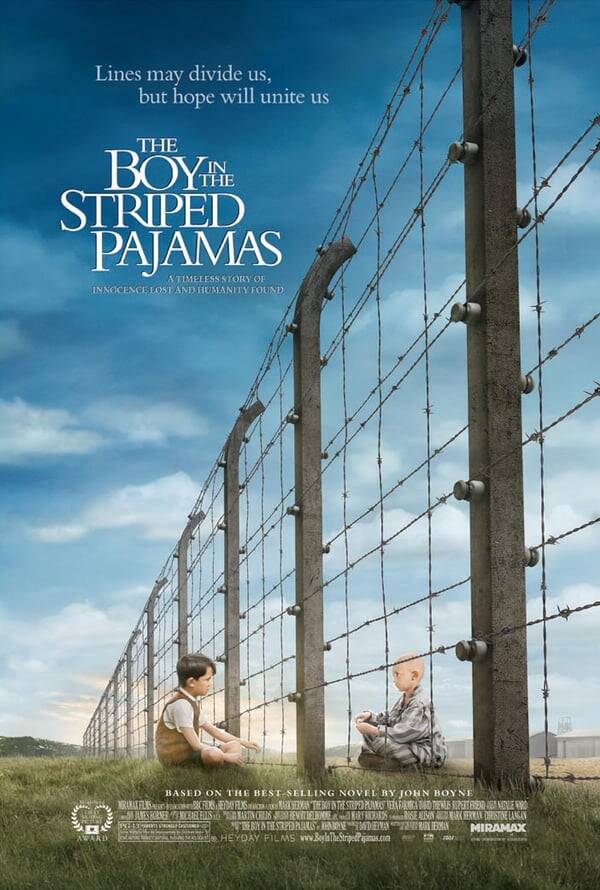
DramaWar
Director:
Mark Herman
Release Date:
Wed Nov 26 2008
Star Cast:
Asa Butterfield, David Thewlis, Rupert Friend
Budget:
$12,500,000 (estimated)
Box Office (Worldwide):
$40,416,563
The Boy in the Striped Pyjama is a British holocaust movie that is based on a novel of the same name, written by John Boyne. The film is a tragedy about a pair of eight-year-olds who experience life in the Nazi concentration camp.
The film starts with the young German boy Bruno who moves with his family to a home near the concentration camp. Despite the constant Nazi propaganda, he does not hold any animosity toward Jews.
Out of sheer boredom, he searches for friends to play with and finds young Schmuel, who is a Jew. Both boys form a deep friendship and play every day. Despite evidence to prove otherwise, both boys believe in their friendship.
When Schmuel’s father goes “missing” in the concentration camp, Bruno offers to help search for him. They accidentally end up in the gas chamber. The film was praised for being a touching and haunting tale that has a twisted punch in the end.
At the same time, some critics felt that the topic of the Holocaust was commercially exploited to present a glossed-over image of the tragedy. Rotten Tomatoes rated the movie 64% and IMDb rated it 7.7.
Fugitive Pieces
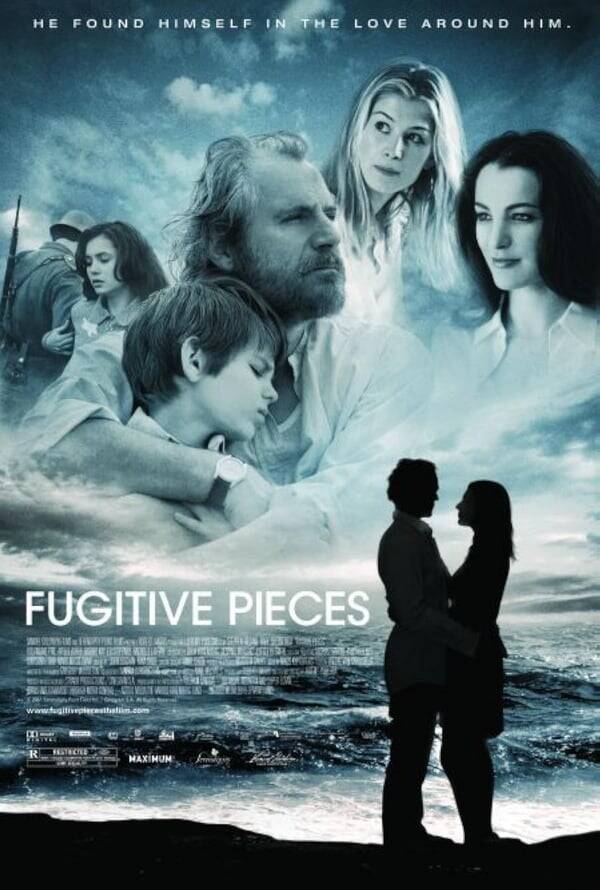
Drama
Director:
Jeremy Podeswa
Release Date:
Fri May 9 2008
Star Cast:
Stephen Dillane, Rade Serbedzija, Rosamund Pike
Budget:
CA$12,000,000 (estimated)
Box Office (Worldwide):
$843,945
Fugitive Pieces is a Canadian film about a Jewish immigrant who escaped Europe during World War II. The film is based on the book written by Anne Michaels on the life of Jakob Beer.
The film was directed by Jeremy Podeswa. The story revolves around the life and journey of Jakob Beer. He was born in Poland to Jewish parents. During the war, they were both shot dead and his sister Bella was taken away.
He escaped the ordeal as he was hiding and soon ran away to become an orphan roaming the streets. A Greek archaeologist working in Poland saw him and smuggled him out of the country to Greece.
After staying in Greece for a while, both of them immigrated to Canada to start a new life. Although he escaped the concentration camps, Beer was constantly plagued by the memories of his sister Bella.
He married and tried to settle down, but could not be happy because of his survivor’s guilt. The film premiered at the Toronto Film Festival and was later screened at film festivals in Vancouver, Greece, Warsaw, and more.
Rotten Tomatoes gave it a rating of 68%. Critics opined that the film was a moving tale that was too subtle but superbly portrayed. IMDb rated the film a 7.
Amen.
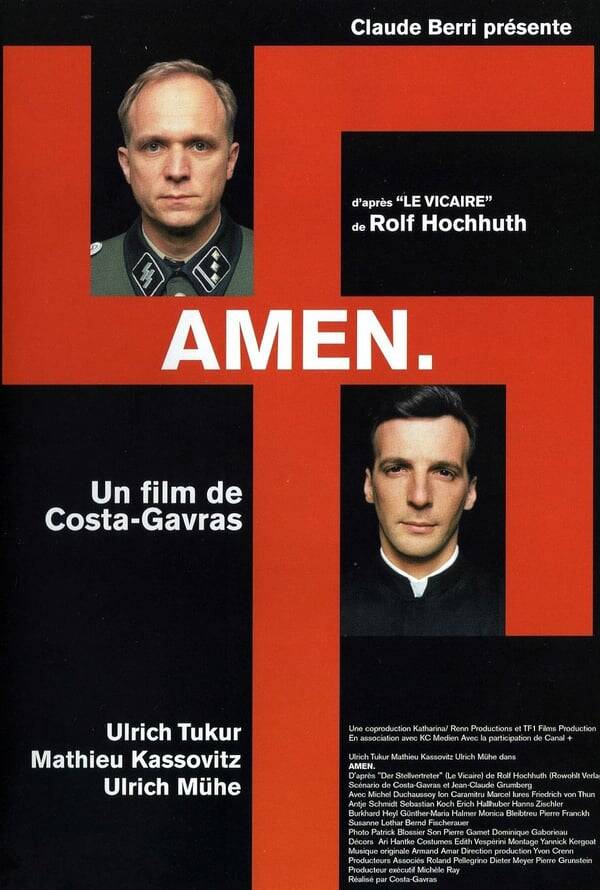
BiographyCrimeDrama
Director:
Costa-Gavras
Release Date:
Wed Feb 27 2002
Star Cast:
Ulrich Tukur, Mathieu Kassovitz, Ulrich Mühe
Budget:
FRF 103,000,000 (estimated)
Box Office (Worldwide):
$8,419,052
Amen., a 2002 historical drama, grapples with the Vatican's silence during the Holocaust. SS officer Kurt Gerstein, appalled by his role in supplying Zyklon B to death camps, desperately tries to alert Pope Pius XII to the atrocities.
Young priest Riccardo Fontana is the only one moved by Gerstein's evidence, but they find Vatican diplomacy unwilling to risk angering Nazi Germany. Disillusioned, Fontana joins Gerstein in Auschwitz, sharing the fate of Jews sent there in a failed intervention.
Though commercially modest, Amen. sparked controversy and critical acclaim for its unflinching look at the Church's inaction. By confronting difficult historical complexities, the film resonated with audiences seeking to understand the role of religion and silence in the face of genocide.
The Zookeeper's Wife
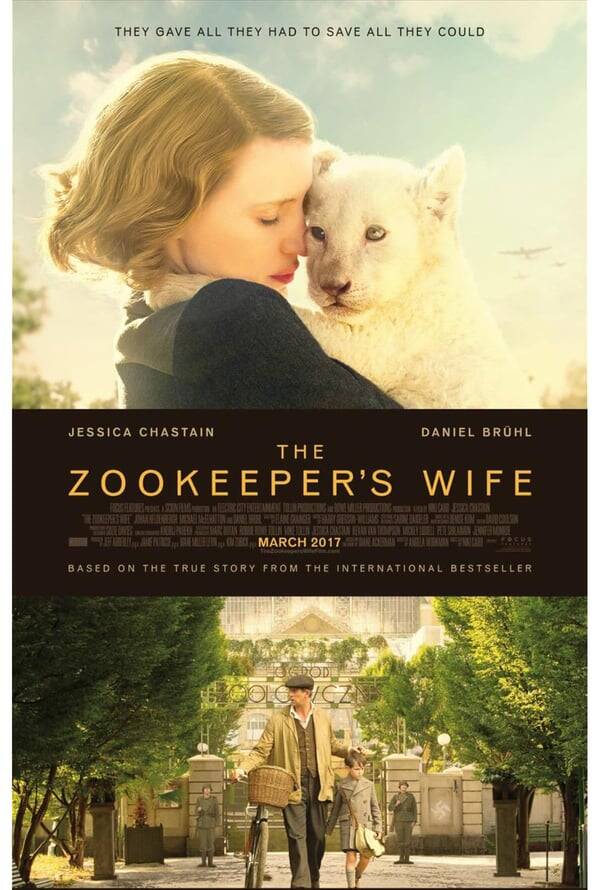
BiographyDramaHistory
Director:
Niki Caro
Release Date:
Fri Apr 7 2017
Star Cast:
Jessica Chastain, Johan Heldenbergh, Daniel Brühl
Budget:
$20,000,000 (estimated)
Box Office (Worldwide):
$26,152,835
The Zookeeper’s Wife is a war movie based on a Polish couple and their efforts to rescue as many Jews as they can. The film was directed by Niki Caro and the story is based on a non-fictional book of the same name written by Diane Ackerman.
The story is set in the year 1939 when the Nazi party overtook Warsaw and occupied Poland. The Germans started to force the Jews into ghettos. The Polish resistance army was failing miserably in keeping the Germans at bay.
At this time, the head of Warsaw Zoo, Dr. Heck aligns himself with the Nazi party to start reforming the zoo and kick out the Jews. The Zabinski family are resistance fighters, and they use all their resources like the zoo cages, their home, and the tunnels beneath the zoo to illegally house rescued Jews.
They are successful to a certain degree in moving people from the ghettos to the temporary housing in the zoo. When Dr. Heck realizes their affiliation with the resistance fighters, he rushes to imprison them and send the Jews to the concentration camps.
The Zookeeper’s Wife was met with mixed reviews. The critics were unhappy with the way the film concentrated more on the emotional aspect of the story than on creating a grand showcase of the events.
Although the facts were accurate to a large extent, there were creative liberties in the relationship and its portrayal. It got a rating of 7 on IMDb and 64% fresh on Rotten Tomatoes.
Blessed Is the Match
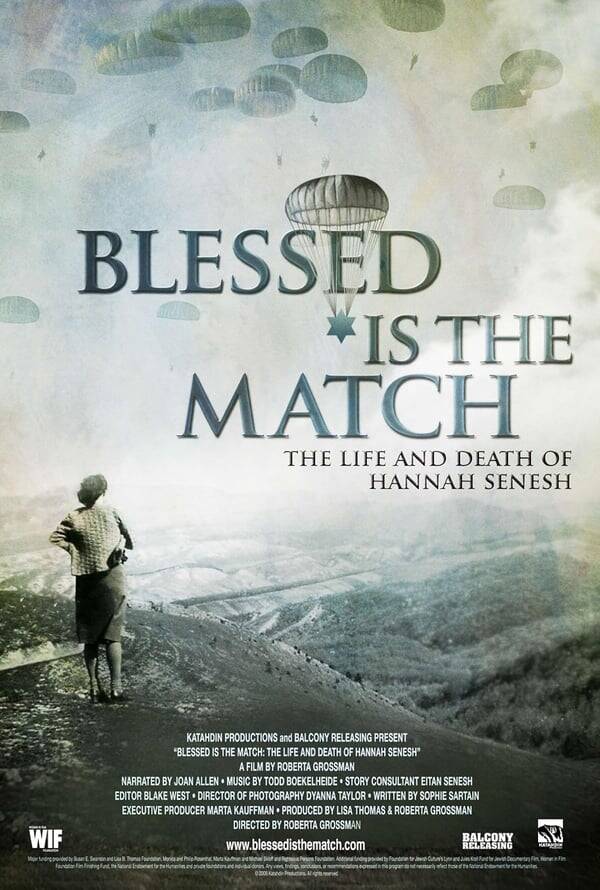
DocumentaryBiographyHistory
Director:
Roberta Grossman
Release Date:
Wed Jan 28 2009
Star Cast:
Peter Hay, Judy Baumel-Schwartz, Michael Berenbaum
Box Office (Worldwide):
$18,654
Blessed Is the Match: The Life and Death of Hannah Senesh, shortened to Blessed is the Match is a documentary film about the life and work of Hannah Szenes or Senesh.
The documentary was made based on the entries in her journal and witness accounts from her cellmates and fellow prisoners. Hannah Senesh was a Jewish-Hungarian poet and playwright. She finished her education in 1939 and witnessed the persecution of Jews in Hungary.
She joined the Haganah, which was the precursor to the Israel Defence Force and trained for the Special Operations Executive. She joined the mission to infiltrate Hungary and rescue the Jews from being sent to the concentration camps in Auschwitz.
She was captured in March 1944 by the Hungarian gendarmes and subjected to harsh interrogation for information on her mission and transmitter codes. She never broke down or divulged any info.
After a brief trial for treason, she was sentenced to execution in November 1944. This documentary won the Audience Award at the Atlanta Jewish Film Festival. It was reviewed by the New York Times for portraying the courage and the missions of Senesh, without giving away much about her character.
The film was rated 7 on IMDb and got a 68% fresh rating on Rotten Tomatoes.
Defiance
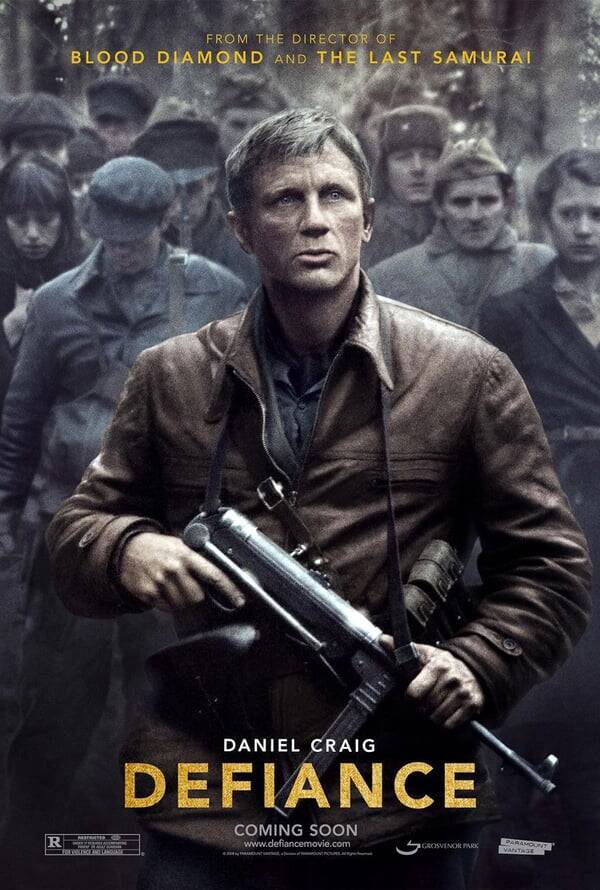
ActionDramaHistory
Director:
Edward Zwick
Release Date:
Fri Jan 16 2009
Star Cast:
Daniel Craig, Liev Schreiber, Jamie Bell
Budget:
$32,000,000 (estimated)
Box Office (Worldwide):
$51,262,751
Defiance is a film about the Polish-Jewish Bielski brothers who led the Bielski Partisan during the peak of World War II. The film is based on the account of Nechama Tec in the book Defiance: The Bielski Partisan.
The film was criticized for not including the Polish massacre by the Bielski Partisan, although there is no clear evidence of their participation in the massacre. The Bielski brothers, Tuvia, Zus, Asael, and Aron escape into the Naliboki forest in Belarus after their family was killed in the Jewish ghetto by the Nazis.
The Bielski partisans initially hid in the forest to be safe from Nazi persecution, but later, they started to rescue other Jews from the ghettos. They built large camps in the forest that had a hospital, school, and housing for the rescued Jews.
They used their military training from the Red Army to protect the Jewish settlement and evade capture. By the end of the war, Tuvia, Zus, and Aron survive, while Asael dies in the battle of Königsberg in 1945.
The film was met with mixed reviews by the critics. Although the film was praised for its production quality and story, it was criticized for the lack of artistic value.
They said that the film lacked the emotional punch of the actual story. IMDb gave it 7.2 and Rotten Tomatoes gave it a 58% rating.
Woman in Gold
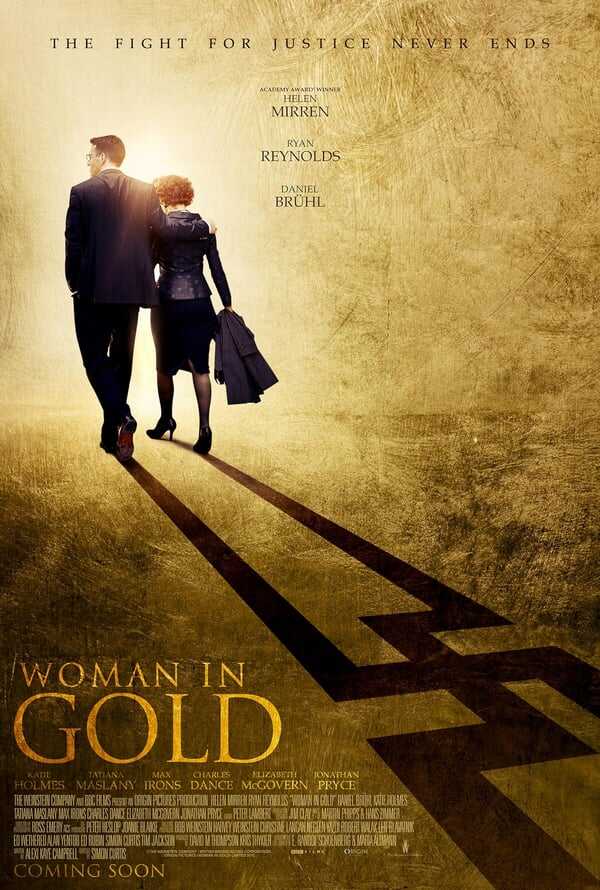
BiographyDramaHistory
Director:
Simon Curtis
Release Date:
Fri Apr 10 2015
Star Cast:
Helen Mirren, Ryan Reynolds, Daniel Brühl
Budget:
$11,000,000 (estimated)
Box Office (Worldwide):
$61,619,773
Woman in Gold is a biographical drama about the true story of Maria Altmann. The film was directed by Simon Curtis and based on the story written by Alexis Kaye Campbell.
The film is a testament to continuing the fight for justice despite so many decades since the Holocaust ended. Maria Altmann is an elderly Jewish lady who lives in Los Angeles and fights to have her family heirlooms restored to her.
The problem is that the heirlooms happen to be highly prized paintings of Gustav Klimt that were stolen by the Nazis during their invasion of Vienna, Austria. Mrs. Altmann engages the services of the lawyer, Randy Schoenberg, to file a case in the US courts to have the government of Austria held accountable to return the paintings.
The paintings were valued at close to $150 million and hence, they were difficult to retrieve from the national museum of Vienna. The film was criticized for its dull treatment of a fascinating story.
Although, the acting of Dame Helen Mirren and Ryan Reynolds was highly praised. IMDb gave it a rating of 7.3 and Rotten Tomatoes rated it 57%.
The Counterfeiters
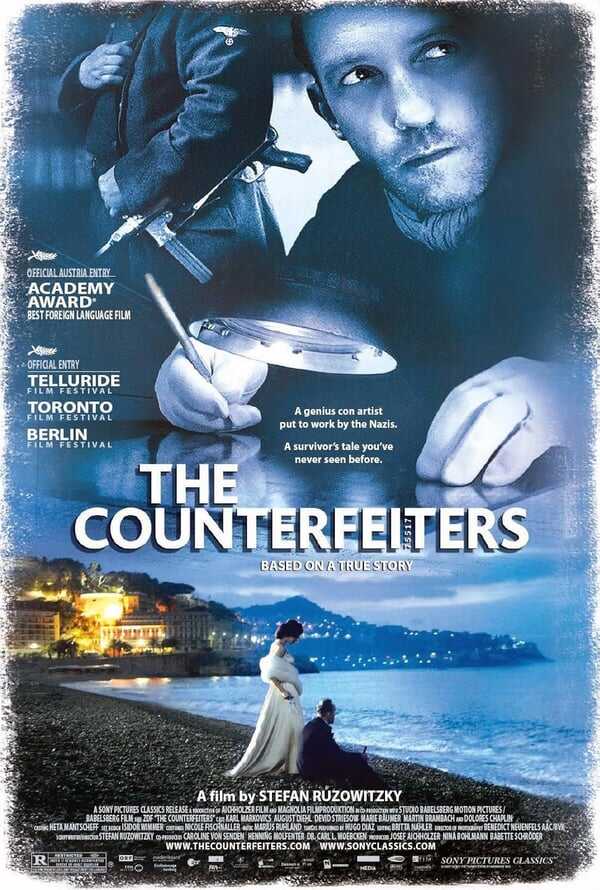
CrimeDramaHistory
Director:
Stefan Ruzowitzky
Release Date:
Fri Apr 18 2008
Star Cast:
Karl Markovics, August Diehl, Devid Striesow
Budget:
€4,200,000 (estimated)
Box Office (Worldwide):
$18,814,713
The Counterfeiters is an Austrian-German film that is based on Operation Bernhard which the Nazis conducted to destabilize the Allied Forces. The film is a fictionalized account of the events as recounted in a memoir by Adolf Burger.
The film is set in the Sachsenhausen concentration camp where a set of Jewish forgers and typographers are assigned the job to counterfeit the British Pound and the US Dollar notes.
After having experienced the struggles and dangers of regular internment in the concentration camp, these forgers are enticed with small luxuries like decent bunk beds, sufficient rations, or working toilets, to begin the forgery.
While the forgers continue to face brutality and hate from the SS Guards, they are aware and concerned about the state of their fellow prisoners and the German war efforts.
In the end, the mission is abandoned when the Red Army reaches the Sachsenhausen camp. The film won an Academy Award for Best Foreign Film along with an award for actor in a supporting role at the German Film Awards.
The film was also nominated for a Golden Bear at the Berlin International Film Festival. Rotten Tomatoes gave the film a score of 93% and IMDb rated it 7.6.
The Book Thief
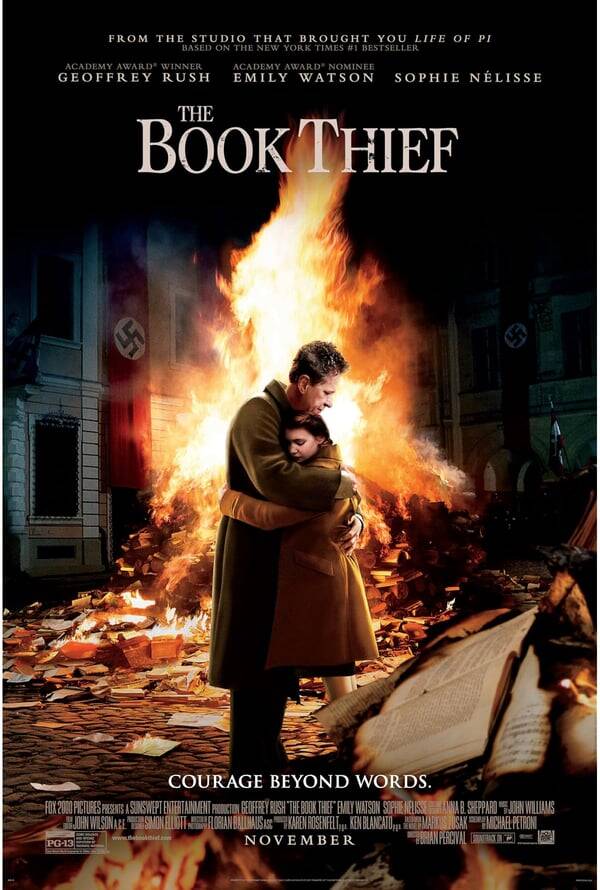
DramaWar
Director:
Brian Percival
Release Date:
Wed Nov 27 2013
Star Cast:
Sophie Nélisse, Geoffrey Rush, Emily Watson
Budget:
$19,000,000 (estimated)
Box Office (Worldwide):
$76,586,316
The Book Thief is a novel written by Markus Zusak. It was adapted into a movie by Brian Percival and stars Geoffrey Rush, Emily Watson, and Sophie Nelisse in prominent roles.
The film is about a young girl adopted into a German family during World War II. She is taught how to read by her kind-hearted stepfather and she soon becomes addicted to reading.
She discovers that her family is sheltering a young Jew, Max from the Nazi soldiers. The family faces difficulties hiding their identity as Jew sympathizers and staying alive. The only thing that keeps the girl sane is her love for reading.
Eventually, the family has torn apart when the village is accidentally bombed and all the friends that she has have died except for the Mayor’s wife. The film’s music was highly praised as John Williams received a nomination for Best Original Score from The Oscars and the BAFTAs, apart from nominations at the Saturn Awards, Golden Globes, and more.
The film was criticized for being too safe and timid in its portrayal of Nazi Germany.
The Shop on Main Street
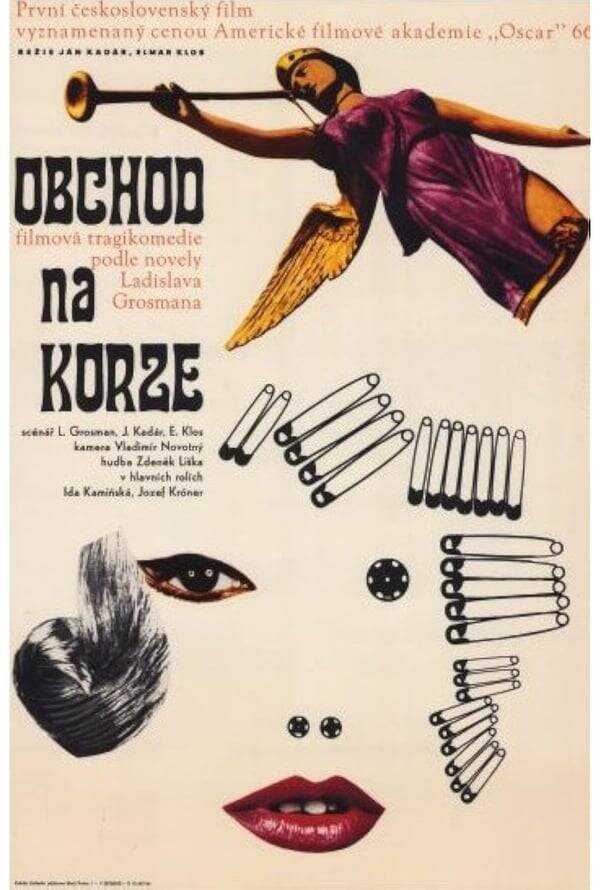
DramaWar
Director:
Ján Kadár, Elmar Klos
Release Date:
Mon Jan 24 1966
Star Cast:
Ida Kaminska, Jozef Kroner, Frantisek Zvarík
The Shop on Main Street is a Czech/Slovak film about the anti-Semitic policies of the Fascist government in the Slovak state. The film was funded in part by the Czechoslovakian central authorities and directed by Ján Kadár, and Elmar Klos.
The film is about an Aryanization policy of the government in Czechoslovakia. As part of this policy, the local fascist authorities in the town, place non-Jews as overseers of all establishments owned by Jews.
So, a mild-mannered local carpenter, Anton Brtko, is chosen to take over a sewing notions shop. It was owned by an elderly Jewish widow, Rozália Lautmannová. What starts as a simple Aryanization effort takes a more sinister turn as the authorities round up all the local Jews to be transported.
Since Brtko is aware of what is happening, he is conflicted about whether to send out the Jewish woman or protect her. In 1965, the film won the Academy Award for Best Foreign Language Film.
It was also entered at the Cannes Film Festival. Rotten Tomatoes rated the movie 100% fresh and IMDb gave it a score of 8.3.
The Round Up
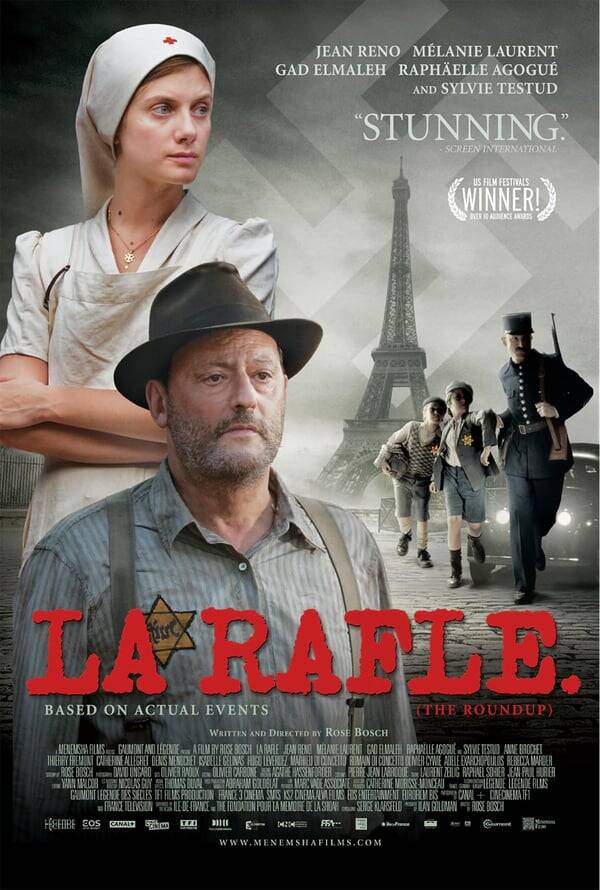
DramaHistoryWar
Director:
Rose Bosch
Release Date:
Wed Mar 10 2010
Star Cast:
Jean Reno, Mélanie Laurent, Gad Elmaleh
Budget:
€20,000,000 (estimated)
Box Office (Worldwide):
$25,623,521
The Roundup is a French film that was made by Rosalyne Bosch. It is based on a true story about a young Jewish boy from Paris during the events of Vel’ d’Hiv.
The story has many true characters and real people with minor changes in the story. The film starts with the events of Vel’ d’Hiv when all the Jews in Paris were rounded up by the Vichy government which was secret Nazi Supporters.
We see different Jewish families that are separated and sent to extermination camps. Initially, the children were kept alive and treated with minimum food and medicines, but later, even they were killed at the extermination camps.
The efforts put forth by people who risked their lives to save Jews are shown on a very emotional level. Another critic praised the director for highlighting the efforts of all the ordinary people, and not just the lonesome characters like in Schindler’s list, etc.
The Long Way Home
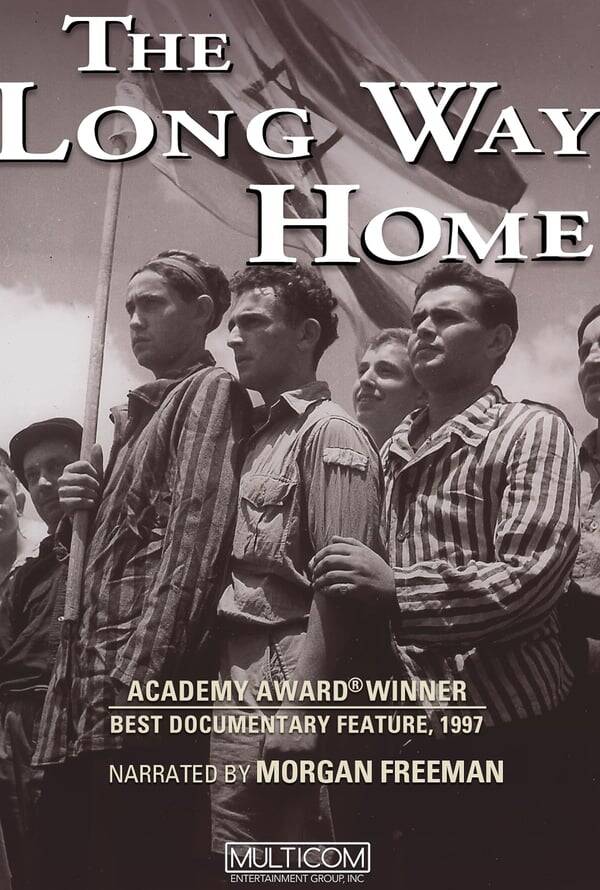
DocumentaryHistoryWar
Director:
Mark Jonathan Harris
Release Date:
Fri Sep 19 1997
Star Cast:
Morgan Freeman, Israel Lau, Livia Shacter
Box Office (Worldwide):
$60,509
"The Long Way Home" is a 1997 documentary film directed by Mark Jonathan Harris, highlighting the experiences of Jewish refugees after World War II and their role in the creation of the State of Israel.
The film depicts the difficult conditions faced by Jewish refugees in post-war Europe, marked by poverty and enduring antisemitism. It explores their aspirations to immigrate to the British Mandate of Palestine, where they often found themselves detained in camps in Cyprus due to British immigration restrictions.
The documentary also focuses on the formation of the State of Israel, including the debates involving Palestinian Jews, President Harry S. Truman, and the United Nations. Narrated by Morgan Freeman, "The Long Way Home" won the Academy Award for Best Documentary Feature in 1998.
The Seventh Cross
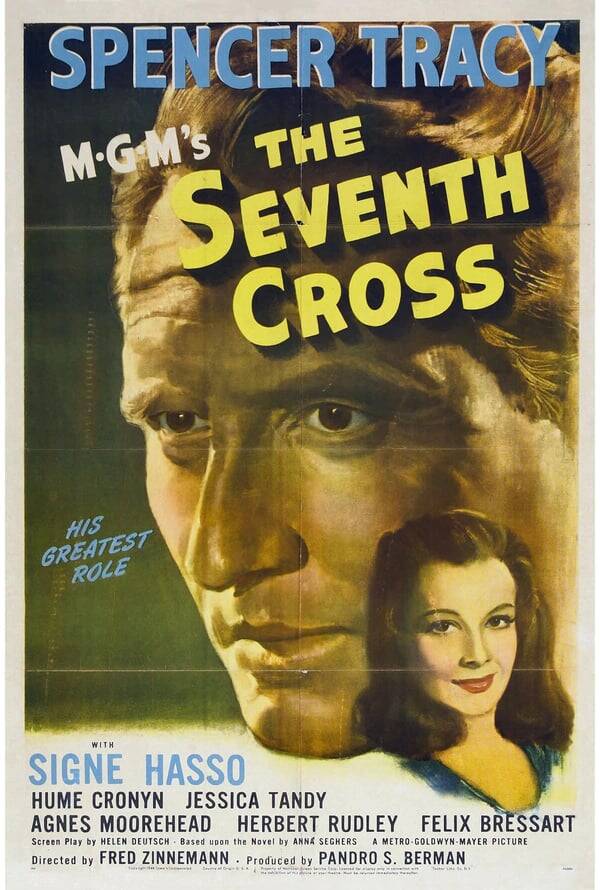
DramaFilm-NoirMystery
Director:
Fred Zinnemann
Release Date:
Mon Jul 24 1944
Star Cast:
Spencer Tracy, Signe Hasso, Hume Cronyn
Budget:
$1,300,000 (estimated)
The Seventh Cross is a film based on a novel of the same name, written by Anna Seghers, who was herself a Jewish escapee during the war. The film was one of the few movies made about the Nazi Concentration camps while the war was still going on.
The film follows seven escapees from a fictional concentration camp. As each escapee is caught, he is put up on a cross as a warning to everyone. Heisler is the only escapee who survives, but he has lost all faith and hope in humanity among the people.
He is betrayed by the one he loves. However, Heisler’s friend risks his wife and children to help him as best as he can. He protects him and guides him to the German resistance army which is helping him get safe passage out of there.
Along the way, many kind-hearted Germans do little things to hide him from danger until he gets away. The film was nominated for an Academy Award for Best Actor in a Supporting Role for Hume Cronyn.
The film was rated 100% fresh on Rotten Tomatoes. IMDb also gave it a strong score of 7.4.
The Garden of the Finzi-Continis
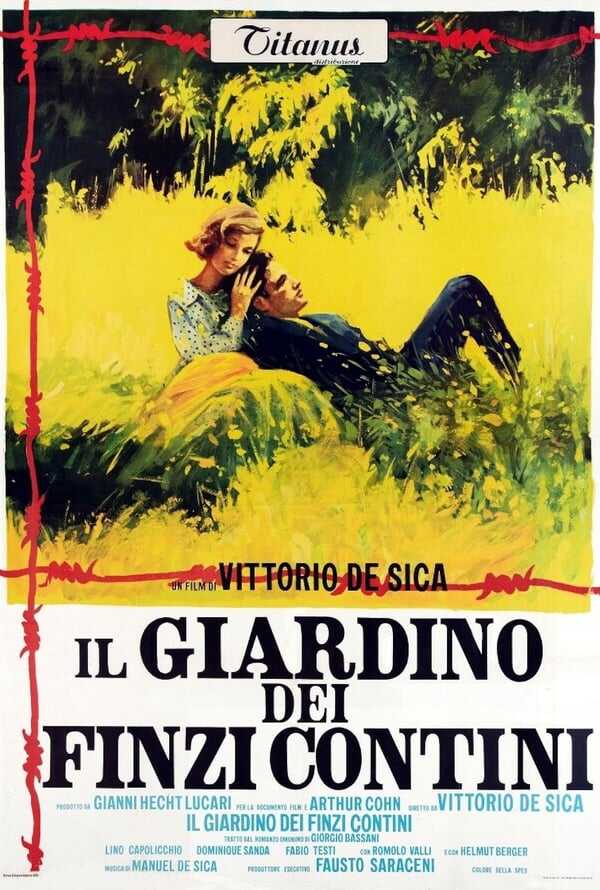
DramaHistoryWar
Director:
Vittorio De Sica
Release Date:
Thu Dec 16 1971
Star Cast:
Dominique Sanda, Lino Capolicchio, Helmut Berger
The Garden of the Finzi-Continis is an Italian film made by Vittorio De Sica. It is a semi-autobiographical tale of the Italian Jewish author Giorgio Bassani. It is a tragic tale of a group of young Italian Jews who perished in the face of the Fascist Italian government.
The film follows the idyllic days spent by a group of young Jewish youth in Ferrano Italy in the 1930s. They were unaware of the political turmoil that was sweeping Europe.
They spent their days playing tennis in the garden of the Finzi-Continis, who was a wealthy Jewish family. The film won the Golden Bear at the Berlin International Film Festival.
It launched the career of quite a few talented Italian actors and actresses. The film also won an Academy Award for Best Foreign Film and a nomination for Best Adapted Screenplay.
Constantine's Sword
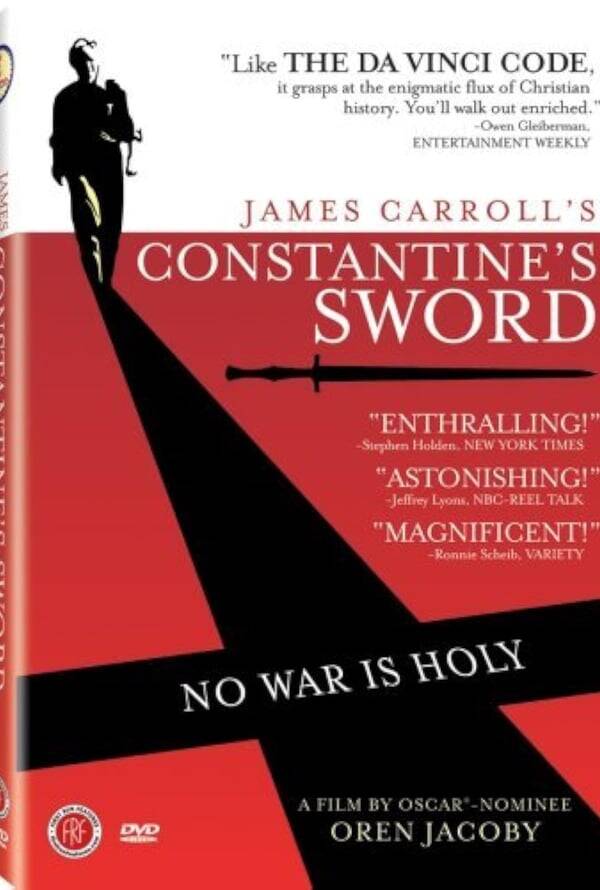
DocumentaryBiography
Director:
Oren Jacoby
Release Date:
Fri Apr 18 2008
Star Cast:
Liev Schreiber, Philip Bosco, Natasha Richardson
Box Office (Worldwide):
$179,507
Constantine’s Sword is a documentary based on James Carroll's book of the same name. It is a study of the relationship between the Catholic Church and Jews. The documentary film was produced and directed by Oren Jacoby, who previously won an Academy Award.
The documentary focuses on religious wars and their beginnings in Christianity. James Carroll is a catholic priest who is the son of an air force general. He uses his unique position to view the unholy alliance between religion and war.
The film’s poster declares at the start that 'No War is Holy’ and in accordance with this concept, he studies the long history of xenophobia in Christianity from the start of the Crusades, and the Roman Inquisition till the anti-judaism stand that was displayed.
The film got a rating of 7.1 on IMDb and a score of 87% on Rotten Tomatoes. The film has been described as a poignant and passionately presented depiction of church-sanctioned crimes against Jews, by the website spirituality and practice.
Divided We Fall
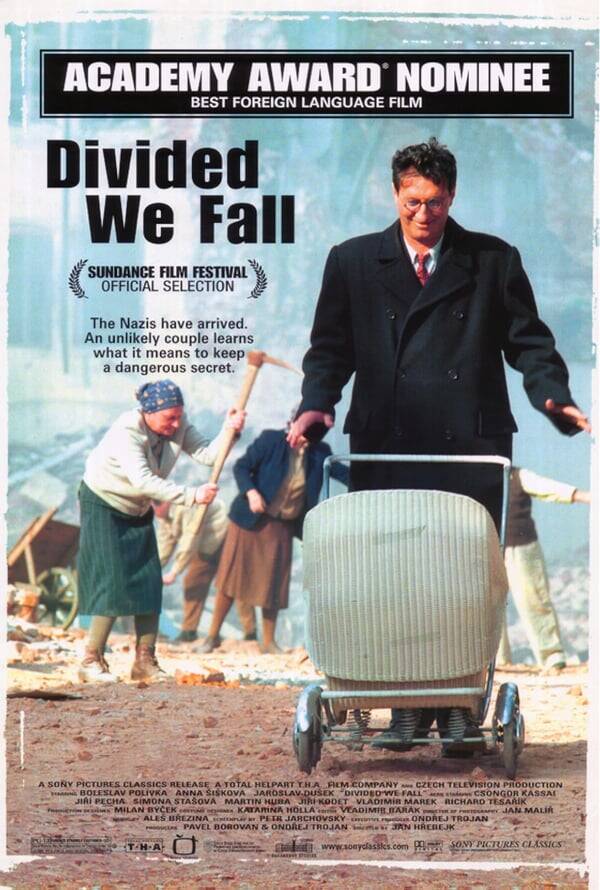
ComedyDramaWar
Director:
Jan Hrebejk
Release Date:
Thu Mar 16 2000
Star Cast:
Bolek Polívka, Csongor Kassai, Jaroslav Dusek
Box Office (Worldwide):
$2,046,440
Divided We Fall is a Czech war movie that was directed by Jan Hřebejk. The name of the film in Czech, literally, translates to We Must Help Each Other. The film was nominated for an Academy Award for Best Foreign Film.
The story is about the family of Cizeks. The husband, Josef, hates the Nazis. He shelters David, who has escaped from a nearby concentration camp. While his wife, Maria is caring and loving to the Jewish kids, she is against her husband’s behavior.
She wants him to become a Nazi Collaborator so that they can have safety and security. Josef’s friend, Horst, is a collaborator and vouches for Josef’s family as Nazi collaborators.
However, he often comes to their home and sees young David staying with them. After the war ends and the Czech resistance army threatens to kill them, David vouches for them as Jewish supporters and saves them.
Divided We Fall was nominated for Best Foreign Film at the Academy Awards. Anna Siskova, who played Mrs. Cizek won the Lion Award for her role. The film was also appreciated for skillfully balancing the sensitive topic of Nazis, the Holocaust, and war with humor.
Rotten Tomatoes rated the film, 90% fresh.
Sobibor
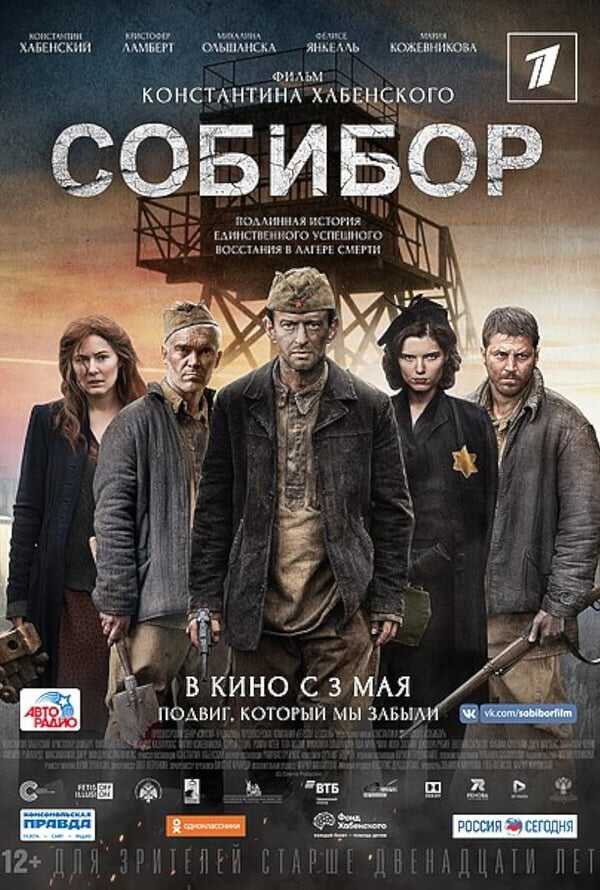
DramaHistoryThriller
Director:
Konstantin Khabenskiy
Release Date:
Fri Mar 29 2019
Star Cast:
Konstantin Khabenskiy, Christopher Lambert, Felice Jankell
Box Office (Worldwide):
$5,096,619
Sobibor is a Russian film about the revolt and the escape attempt from the Polish extermination camp in Sobibor in 1943. The film was written by Konstantin Khabensky, Aleksandr Adabashyan, Andrei Nazarov, Anna Chernakova and directed by Konstantin Khabensky.
A Russian Jewish soldier from the Red Army is captured by the Germans and sent to the extermination camps of Sobibor. They are all due to be sent to the gas chamber when Pachersky, the Jewish Russian soldier, plans and carries out the revolt.
The Sobibor Revolt was partially successful with the escape of 300 prisoners, but only 60 survived the war. The film was Russia’s official entry for the Best Foreign Film category at the 91st Academy Awards and it received the nomination too.
Although there were a few historical inaccuracies, the film did well worldwide. On a budget of $2.4 million, it grossed over $ 5 million across the globe. IMDb gave a rating of 6.4, and Rotten Tomatoes rated the film 75% fresh.
Mother Night
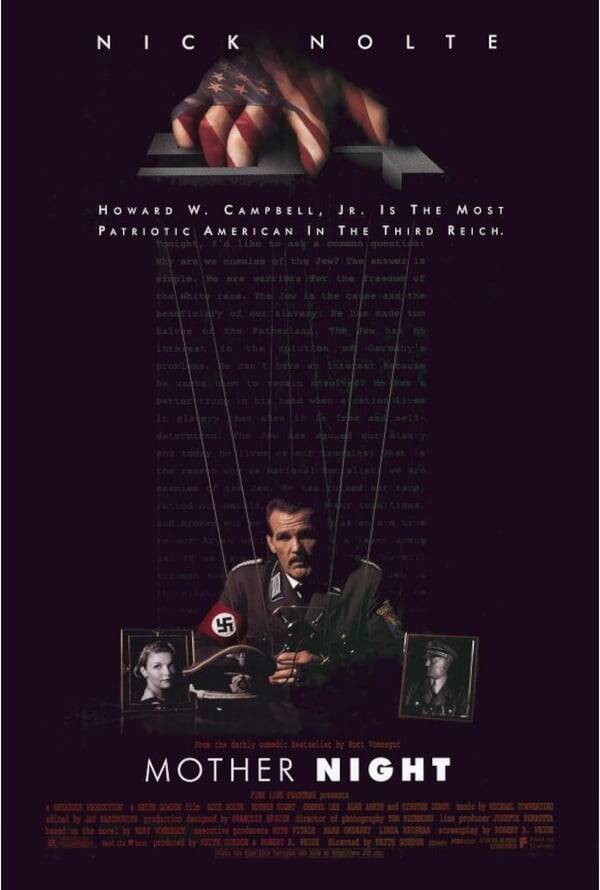
DramaRomanceWar
Director:
Keith Gordon
Release Date:
Fri Nov 1 1996
Star Cast:
Nick Nolte, Sheryl Lee, Tony Robinow
Budget:
$6,000,000 (estimated)
Box Office (Worldwide):
$403,701
Mother Night is a film based on the novel of the same name by Kurt Vonnegut. It is about an American spy who lived and worked in Germany throughout World War II and his role had been kept a secret by the government.
The film is narrated through the flashbacks and memories of Howard Campbell as he writes his memoirs from his jail cell in Israel. He worked as a Nazi propagandist during the war and passed on messages to the Allied governments through coded messages.
After the war, he is relocated to New York with a new identity, but he is captured and put to trial for his role. Although he maintains that he was an American spy, it is up to his government to back him up and blow the cover on a secret operation.
The film was met with mixed reviews. Although all critics praised the performance of Nick Nolte as the American spy, the story was panned as being vague. Rotten Tomatoes gave the movie a rating of 63%, while IMDb gave it a rating of 7.1.
All My Loved Ones
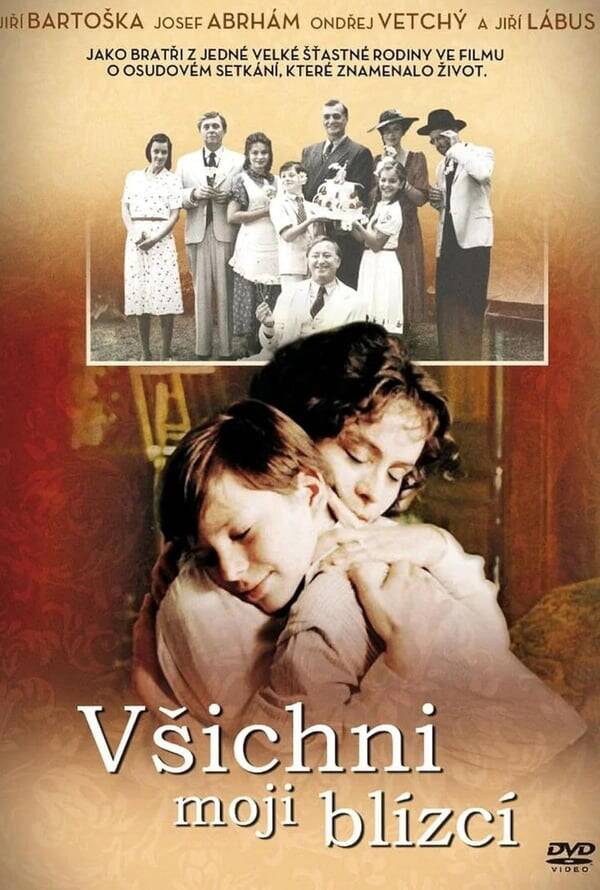
DramaWar
Director:
Matej Minac
Release Date:
Thu Oct 21 1999
Star Cast:
Rupert Graves, Josef Abrhám, Jirí Bartoska
Box Office (Worldwide):
$6,237
All My Loved Ones is a Czech language film that was made in collaboration between Cezch, Slovakia, and Poland. The film is about the Cezch Kindertransport before World War II.
The film was Slovakia’s official entry to the Best Foreign Film category at the 72nd Academy Awards. The film is told through the experiences of Silberstein's family members. They were the upwardly mobile Jewish family in Czechoslovakia when the Nazis invaded.
They ignored the early warnings and did not evacuate in time. Due to this when the Nazis came, they were stuck with no way of escaping. At this time, the British humanitarian, Nicholas Winton, becomes the only hope for the future.
They contact him and try to save the children. While the rest of the family perishes in the hands of the Nazis, a boy, rescued by Winton, tells us the sad and uplifting tale of decent and humane acts done by simple people.
The film was nominated for several awards and it won the Audience Award at Atlanta Jewish Film Festival. At the Czech Lions, the film won the Best Supporting Actor for Jirí Bartoska.
IMDb rated the film a 7.3, with a Rotten Tomatoes rating of 64%.
Tangled
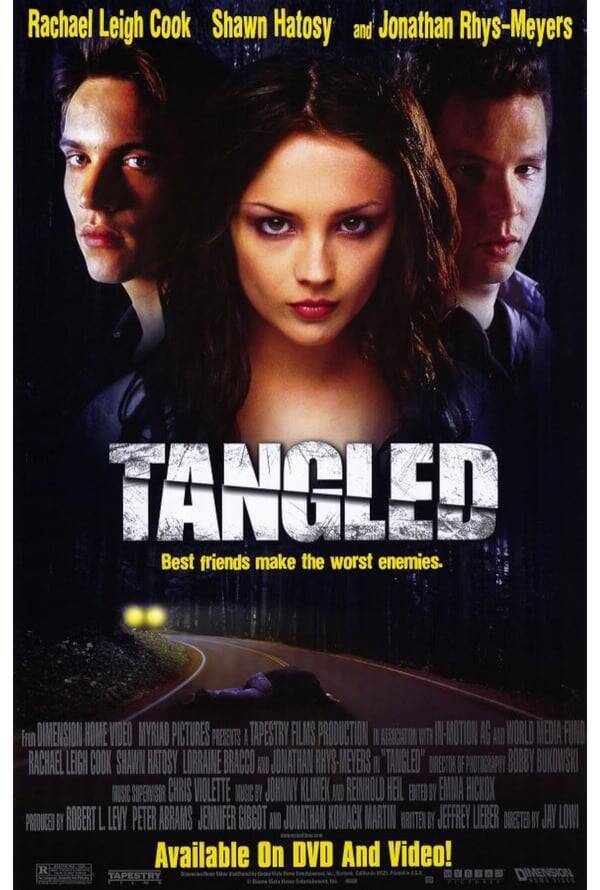
DramaThriller
Director:
Jay Lowi
Release Date:
Fri Nov 2 2001
Star Cast:
Rachael Leigh Cook, Shawn Hatosy, Jonathan Rhys Meyers
Box Office (Worldwide):
$38,407
Conspiracy is a TV movie. It is a British-American production made by Frank Pierson and written by Loring Mendel. The film is a chilling account of the Wannsee conference that was held in 1942 where the “final solution to the Jewish question” is discussed by the top management of the SS, and the Nazi party.
The film starts with Reinhard Herdrich, Heinrich Himmler's right-hand man in the SS, kicking off the meeting by stating the purpose of the meeting. Although many of the attendees are irritated to discuss the same issue again, they agree that simply sending them off to ghettos, and sterilizing them is not the solution.
However, it soon becomes clear that the SS people have already decided on the plan of action, and the Wannsee conference is just an open declaration of it. Adolf Eichmann makes it further clear by stating that he has already tried the gas chamber in mobile trucks, and it had worked.
They plan to build permanent gas chambers in Auschwitz that can handle mass extermination. The casual and clinical manner of their discussions and plan of action is chilling to watch.
The film had an ensemble cast of Colin Firth, David Threlfall, Kenneth Branagh, Stanley Tucci, etc. For the movies, Branagh won an Emmy Award for Best Actor, and Tucci won a Golden Globe for his supporting role.
The Ritchie Boys
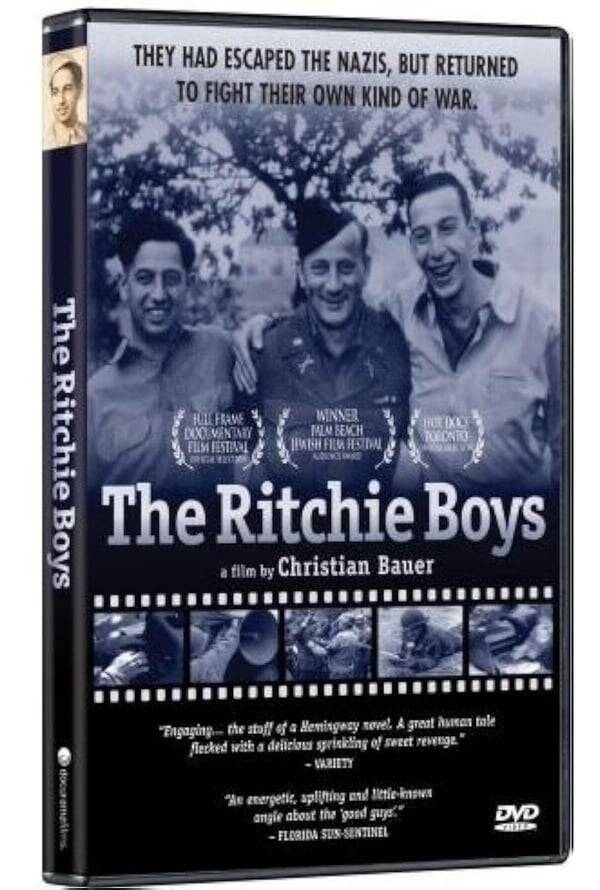
DocumentaryHistoryWar
Director:
Christian Bauer
Release Date:
Sun Feb 13 2005
Star Cast:
Michael Hanrahan, Werner Angress, Victor Brombert
The Ritchie Boys is a war documentary about a secret team of Jewish men who were a part of the US military intelligence unit that has been credited to the early fall of the SS troops.
The documentary was made by Christian Bauer with Michael Hanrahan as the narrator. In this documentary, we see this elite unit of German-Jewish men who formed plans to break the morale, and eventually weaken the SS troops during WWII.
They mainly consisted of refugees, Jewish children who grew up as orphans in the US, and people who could speak the language of the SS troops like German, French, Italian, Polish, etc.
We hear from people like Albert Einstein, Marlene Dietrich, Victor Brombert, Werner Angress, Phillip Glaessner, and more. These Ritchie boys were trained in US intelligence and counterintelligence missions as well as planning, interrogation, psychological warfare, and more.
This documentary received a 100% fresh rating on Rotten Tomatoes. IMDb rated the film 7.5. This well-researched film took seven years to completely research and compile and three years to gather the funds to make it.
Sis ve Gece
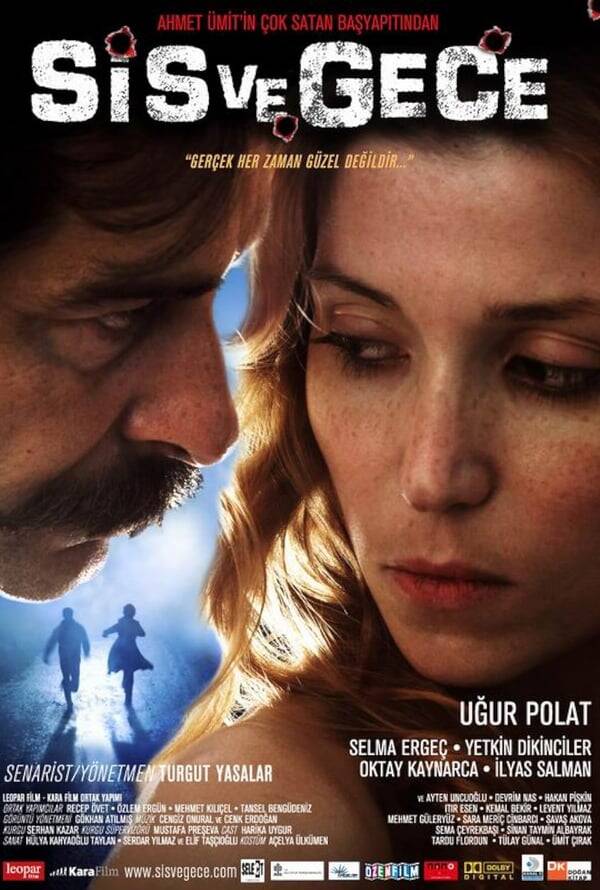
AdventureDramaMystery
Director:
Turgut Yasalar
Release Date:
Fri Feb 23 2007
Star Cast:
Ugur Polat, Selma Ergeç, Ayten Uncuoglu
Box Office (Worldwide):
$292,846
The film is a French short documentary about the Nazi concentration camps. It was made by Alain Resnais with a script written by Jean Cayrol. The film was made ten years after the Holocaust ended, liberating the Jews.
The title is taken from a German program, Nacht und Nebel, which was about abductions and disappearances that were sanctioned by Nazi Germans. The film was shot in Auschwitz and Mauthausen-Gusen concentration camp with alternating shots of the present-day camp, and stock images of when the camp was in use.
Michel Bouquet narrated the rise of Nazi ideology. Some of the images were very disturbing and gruesome. The French authorities tried to block the release of the film as some images depicted the excesses of the Vichy government in eliminating the Jews.
Yet the film was released at the Cannes Film Festival and won widespread acclaim.

